Names of Allah: 20-34 Page 6
A
Zikr-e-Habib
Righteous indignation for honour of faith and Prophet Muhammad
Response to an appeal of British Prime Minister, David Lloyd George: Hazrat Musleh-e-Maud’s lectures in Lahore and Amritsar, 1920
Page 12 Page 8
THE
AL HAKAM | Friday 23 June 2023 | Issue CCLXXV
‘May this mosque prove to be a shining beacon of peace’
Hazrat Khalifatul Masih V inaugurates Baitus Salaam Mosque in Scunthorpe, UK
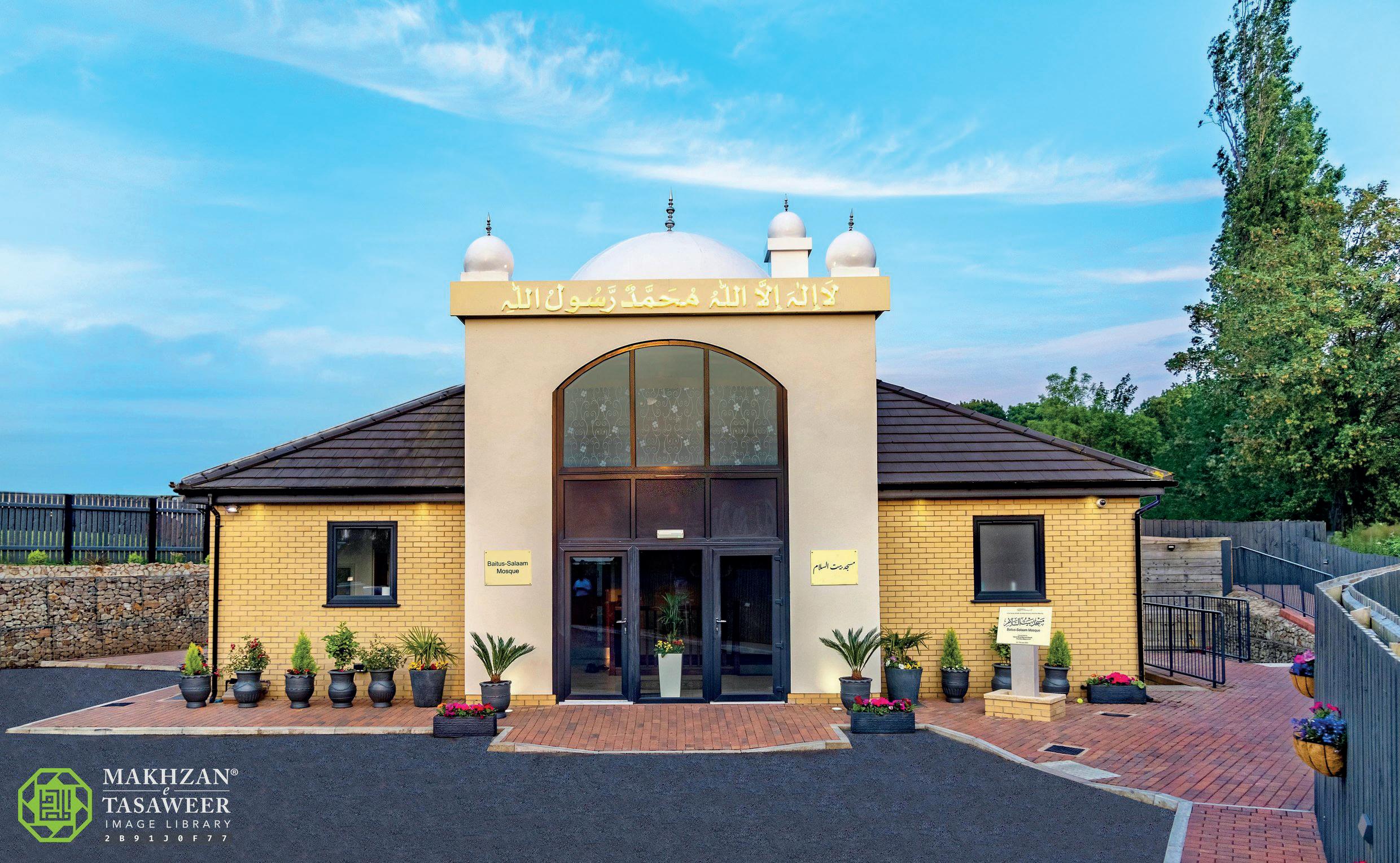
Page 10
At around 16:00 BST on 17 June 2023, Hazrat Khalifatul Masih V, may Allah be his Helper, arrived at the premises for the inauguration of Baitus Salaam Mosque in Scunthorpe,
هللا ﻰﻠﺻ ��ﻨلا ﻦﻋ ،ةريرﻫ ��أ ﻦﻋ ﻰﻀق اﻤل هللا نإ :لاق ﻢﻠﺳو ﻪيﻠ� نإ ﻪﺷرﻋ قوف هدﻨﻋ ﺐتﻛ ﻖﻠ��ا .��ﻀﻏ تقﺒﺳ ��ﻤﺣر ‘My mercy precedes My anger’
Hazrat Abu Hurairara narrated, “The Prophetsa said, ‘When Allah had finished His creation, He wrote with Him over His Throne: ‘My mercy precedes My anger.’” (Sahih al-Bukhari, Kitab at-tawhid, Bab ‘wa kana ‘arshuhu ‘ala l-ma’i, wa huwa rabbu l-‘arshi l-azim’)
How to pray for one’s children
“It is not forbidden but rather permissible for a person to look after their children and other dependents because they are under their care. Such acts will be counted as meritorious and a form of worship, and will comply with God’s commandment.
[...] The essence is to perceive oneself as completely detached in this regard and nurture them purely out of compassion, not for the purpose of creating successors, but with regard to اماما نيقتملِل انلعجاو ‘And make us a model for the righteous’ [Surah al-Furqan,
Ch. 25: V. 75],
Continued on next page >> Continued on next page >>
Ahmadiyya Archive & Research Centre (ARC), 22 Deer Park Road, London, SW19 3TL, UK info@alhakam.org | ISSN 2754-7396 WEEKLY
www.alhakam.org
John: the harbinger of Jesus
Hadith-e-Rasul – Sayings of the Holy Prophet Muhammadsa
Hazrat Mirza Ghulam Ahmadas, In His Own Words
UK, and unveiled the plaque of the mosque and led everyone in silent prayer. Hazrat Amirul Momineenaa inspected the building and planted an olive tree, before proceeding inside the mosque and leading everyone
in Zuhr and Asr salat. There, the local members also had the opportunity to have photographs taken with beloved Huzooraa
<< Continued from previous page
meaning the offspring should serve the faith.
“However, how many are there who beseech in prayer for their children to become champions of faith? Very few indeed. Most people are entirely oblivious as to why they yearn for children. The majority strive simply to establish heirs. They have no other motive, their sole desire being to prevent a relative or non-relative from inheriting their property. But remember, in this way, the faith is entirely ruined.
“The sole wish for one’s children should be that they serve the faith. Similarly, one should marry to produce an abundance of children who will truly serve the faith and be safeguarded from the desires of the self. Any intentions beyond these are misguided. If actions are guided by compassion and righteousness, certain matters become permissible. In this context, even if one leaves wealth and property for their children, it becomes a source of reward. However, if the sole intention is to appoint heirs, carrying all worries and concerns for this purpose alone, then it indeed becomes a sin.” (Al Hakam, 10 March 1904, p. 5; Malfuzat [1988], Vol. 3, pp. 599-600)
<< Continued from previous page
Huzooraa also granted an audience to some of the non-Muslim dignitaries, who had come to attend the inauguration.
Huzooraa then went to the formal reception marquee and conveyed salaam to all the attendees. Dignitaries, leaders of various faiths, friends, locals and neighbours were present for the reception.
Hassan Selby Sahib, missionary at Scunthorpe, recited verses 128-130 of Surah al-Baqarah from the Holy Quran and presented their English translation.
Syed Muzaffar Ahmad, the Regional Amir of North East, welcomed Huzooraa and all the attendees. He then gave an overview of the inception of the Baitus Salaam Mosque and shed light on the opposition they had to face when the request for permission to construct this mosque was presented before the council. Syed Muzaffar Ahmad Sahib expressed that the council upheld its values of tolerance and freedom of religion and gave permission for the mosque to be constructed.
Holly Mumby-Croft, Member of Parliament for Scunthorpe, was next to speak. She welcomed Hazrat Khalifatul Masih Vaa to Scunthorpe and said that she had visited the mosque before and expressed her delight about the friendly atmosphere. She said that she was privileged to be at the reception.

Martin John Vickers, Member of Parliament for Cleethorpes, then expressed that he was delighted to be at the inauguration of the mosque and spoke about the challenges faced by the Ahmadiyya Muslim Community before the construction of the mosque.
Councillor Janet Longcake, Mayor of North Lincolnshire Council, then shed light on the importance of community and expressed that, “the Ahmadiyya Community motto ‘Love for All, Hatred for None’, conveys unity,” and added that “your faith is one that promotes peace and harmony, something the world needs right now.”
Address by Hazrat Khalifatul Masih Vaa
Then, Hazrat Amirul Momineenaa came to the podium and after reciting tashahhud and ta‘awwuz, Huzooraa said:
“Peace and blessing of Allah be upon you all. First of all, I sincerely thank all of our guests, who have joined us for the
inauguration of our new mosque here in Scunthorpe.” He acknowledged the generosity of the guests as none of them was directly related to the Ahmadiyya Muslim Jamaat yet they accepted the invitation.
Huzooraa then said that certain hurdles arose before the construction of the mosque but with the grace of Allah, all issues were resolved and eventually, permission was granted. He thanked the council and the relevant authorities. He further expressed thanks and gratitude to “all members of the community who supported us in any way.” He emphasised, “Where we are most grateful to God Almighty we are also very grateful to those who helped us in the construction of the mosque.”
Stressing the importance of thankfulness in Islam, Huzooraa expressed, “Offering my appreciation to you is actually a religious duty because the Holy Founder of Islam, the Holy Prophet, Muhammad, peace and blessings of Allah be upon him, stated that a person who is not thankful to his fellow human beings cannot be grateful to God Almighty. So, from a religious perspective, I am duty-bound to offer my heartfelt appreciation to all of you.”
With regard to the funding for the mosque, Huzooraa explained that this mosque had been funded purely by the contributions of the members of the local jamaat, many of whom made huge financial sacrifices. They contributed to having a place of worship that would be a means of creating a suitable environment to uphold and practice Islam’s ideals and values.
Huzooraa then addressed the fears about Islam in the West and said, “Such fears are understandable, given the climate in which we live where there is a tendency to view Muslims with a degree of suspicion or even as extremist based on the portrayal of Islam in the media and the conduct of the few extremist individuals and groups in recent times.”
Reassuring the guests, however, Huzooraa said, “In this regard, rest assured that nothing could be further from the truth. Islam’s teaching is diametrically opposed to all forms of extremism or terrorism. Islam rejects all forms of violence and teaches peace and harmony, and desires for people of all beliefs and religions to live amicably together in a spirit of mutual tolerance and compassion. It calls for members of society to unite as human beings, irrespective of their differences, in the common cause
of establishing peace and security for all mankind.”
Huzooraa said, “In terms of the objectives of mosques, on one occasion, the Founder of the Ahmadiyya Muslim Community, peace be upon him, stated that ‘if a person wishes to raise awareness of Islam in any town or place, they should build a mosque in that area.’”
Hazrat Amirul Momineenaa stated that it meant, if a mosque was built, non-Muslims would naturally come to observe Islam’s teachings and see how it promotes the spirit of love, peace and brotherhood amongst all people. They would see with their own eyes that where Muslims are duty-bound to fulfil the rights of Allah the Almighty, the teachings of Islam also require them to fulfil the rights of humanity and to seek the very best of all people, irrespective of their faith and beliefs.
Huzooraa said, “We Ahmadi Muslims advocate and subscribe to these true and peaceful teachings of Islam and reject unequivocally those who seek to malign and distort Islam’s noble teachings through their hateful rhetoric and extremist acts.”
Hazrat Amirul Momineenaa said that some people did not understand what Islam actually was and what was the purpose of mosques. “I wish to make it crystal clear that the image created of Islam by extremists is entirely at odds with its actual teachings[…] Islam’s teachings are of peace, security and love,” Huzooraa emphasised.
Hazrat Amirul Momineenaa said, “These are not just my personal views or empty words designed to please or impress you. Rather, these are the teachings of Islam’s Holy Book, which we believe to be the final law-bearing Book and the direct Word of God, received through revelation by the Holy Prophet Muhammad, peace and blessings of Allah be upon him. I am speaking, of course, about the Holy Quran, which, for all Muslims, serves as the basis of our beliefs and how we live our lives. The Holy Quran makes it categorically clear that there is no room for extremism or compulsion in religious matters and that every person is free to live their life according to their beliefs and customs.”
Huzooraa said, “Wherever Muslims build mosques, they are built to emulate and spiritually mirror the true objectives of the first house of God, the Holy Ka‘aba in Mecca, which is the most sacred and holy place in Islam.” He further said, “Indeed, it is the direction of the Holy Ka’bah that

Friday 23 June 2023 | AL HAKAM 2
Photo courtesy of Suhaib Ahmad
every Muslim turns towards whilst offering prayers.”
Hazrat Amirul Momineenaa then gave the example of Chapter 25, verse 24 of the Holy Quran, “The true servants of the Gracious God are those who walk on the earth humbly and when the ignorant address them, they avoid them gracefully by saying peace.”
Huzooraa explained that in this verse, Muslims were commanded to remain humble and patient when they were subjected to harassment and to avoid conflict or disputes. “Muslims are taught that no effort should be spared in upholding the peace of society, to the extent that the Quran instructs Muslims to walk away in the face of intense provocation and offer salaam, that is, greetings of peace, to ignorant and abusive people who speak harshly or seek confrontation.”
Hazrat Amirul Momineenaa said that some people might say that early Islamic history included incidents of warfare, but Huzooraa said, “In reality, these questions indicate an ignorance of early Islamic history.” Huzooraa said such views had been shaped by the opponents of Islam who presented only part of the story and did not give the whole account or context.
Huzoor said, “After Islam was founded, the Holy Prophet Muhammadsa and his followers were subjected to horrific cruelties and sustained oppression.” Many were murdered and they migrated to Medina. However, the idol worshipers of Arabia still did not permit them to live in peace. They waged war against them to eliminate Islam once and for all. Only in those extreme circumstances, Allah allowed them to fight a defensive war.
Huzooraa explained in light of the Holy Quran that Allah commanded Muslims to protect every worship place and defend every faith.
Hazrat Amirul Momineenaa mentioned that the American scholar, Craig Considine, in his book, People of the Book – Prophet Muhmmmad’s Encounters with Christians, states “‘Muhammad and the believers of Muslims ummah created a nation founded upon allyship, civility, cross-cultural interactions, freedom of conscience, freedom of religion, freedom of speech, interreligious dialogue, mutual dependency and religious pluralism.’” [p. 384]
“Accordingly, these are the immaculate standards of religious freedom according to Islam, that all people should have the right to worship according to their religious beliefs and be free to congregate in their places of worship,” Huzooraa said.
Huzooraa said, “In essence, Muslims are duty-bound to not only fulfil the rights of their Creator but also to fulfil the rights of mankind.”
As Huzooraa shifted the focus of his speech to the present times, he made observations about the state of current global conflicts and explained, “Religious wars are no longer taking place. Rather, the conflicts we observe today are geopolitical in nature. If Muslims or Muslim nations are taking any part [in them], it is to fulfil their political ambitions and vested interests, and [they are] not motivated by their religion. Thus, in today’s society, it is not a question of Muslims against non-Muslims, nor are wars being fought to eliminate religion. In addition, it is wrong to suggest that conflict
is limited to Muslim countries. The nonMuslim world is also engaged in warfare, as we see most prominently in Ukraine. Hence, as I have said, the wars taking place today are for territorial or political objectives. And it would be wholly unfair to link them to any religion or religious beliefs.”
It is for this reason and in the face of such global conflicts, Huzooraa said, that alongside building mosques and seeking to convey Islamic teachings, the Ahmadiyya Muslim Community places great emphasis on serving humanity.
Giving some examples of the
that, “All our humanitarian services are offered irrespective of religious beliefs. In fact, most people who benefit from our schools, hospitals, or other humanitarian projects do not adhere to any religion, or at least not to our religion [of Islam]. Our efforts are underpinned and inspired by the teachings of Islam and are rendered purely for the sake and betterment of humanity. We consider the burdens of the weakest members of society to be our own, and that it is our duty to provide health and comfort to all those who are in need or vulnerable.”
In his concluding remarks,
vanish. This mosque has been named ‘The Baitus Salaam Mosque,’ which literally means ‘The House of Peace’. In accordance with this name, I am confident that the local Ahmadi Muslims will be those who foster peace and love in society, observe the laws of the land, and excel in serving their Community and the wider society. God willing, they will forever reflect the true teachings of Islam.”
“In the end, I pray that this mosque proves to be a shining beacon of peace and a means of elevating and strengthening the fabric of societal cohesion. May Allah the Almighty enable the local Ahmadi Muslims to live up to their religious teachings, and may we all, for the betterment of our nation and the world at large, live together in peace and harmony.” Amin
“With these words, I wish to reiterate my heartfelt gratitude to all of you for joining us this evening. May Allah the Almighty bless you all. Thank you very much.”
As the event drew to its end, Huzooraa led everyone present in a silent prayer, following which dinner was served.
History of Scunthorpe Jamaat
Scunthorpe is an industrial town located in North Lincolnshire, within the ceremonial county of Lincolnshire, in England. In 2021, Scunthorpe was home to approximately 80,000 residents. The town is roughly a fourhour car journey away from the Mubarak Mosque in Islamabad, UK.
The Scunthorpe Jamaat has been profoundly fortunate and blessed, for Hazrat Khalifatul Masih Vaa has graced it with his presence on seven distinct occasions over the years. His first visit took place in the year 2004.

The history of Scunthorpe Jamaat traces back to its humble beginnings in the late 90s, when it consisted of only a few families. In 2002, the Jamaat acquired 53 Cliff Closes Road, which served as a mission house for the Scunthorpe Jamaat. However, as time passed, the Jamaat rapidly outgrew this space, prompting the need for a larger mosque. Consequently, plans for a purposebuilt mosque were submitted to the council for approval in 2016. On 24 March 2018, the foundation stone of the Jamaat’s new mosque was laid by Rafiq Ahmed Hayat Sahib, the Amir Jamaat-e-Ahmadiyya UK.
Even though the Community faced significant opposition at the outset, they remained unwavering in their mission. In a beautiful testament to faith, perseverance, dedication and community spirit, the vision eventually materialised in the form of the “Baitus Salaam Mosque.” The mosque now stands not just as a building but as a symbol of peace, brought to life by the grace of Allah and the prayers and guidance of Hazrat Khalifatul Masih Vaa
humanitarian efforts of the Community Huzooraa highlighted, “For example, we have built schools and hospitals in some of the most economically deprived and impoverished countries that provide education and health care to the local people. Further, our Community is providing access to clean water to destitute people living in remote and underprivileged parts of the world by installing water wells and pumps in their local communities.”
Underscoring the universal nature of these humanitarian services, Huzooraa clarified
Huzooraa said:
“In short, Islamic teaching obliges us to live peacefully and to coexist with other people. It requires us to serve our communities, to strive to enrich them, and to contribute to their development.”
“Now that this mosque has been opened. I am sure that local people in Scunthorpe and the surrounding areas will see for themselves these true Islamic values in practice. Consequently, I believe that if anyone still harbours any reservations or fears about this mosque, they will soon
The Baitus Salaam Mosque is located at 53 Cliff Closes Road. The mosque includes a multi-purpose hall and a library. It has the capacity to accommodate 250-300 individuals. Nestled among homes, this mosque emanates a warm and inviting atmosphere. By the grace of Allah, the mosque was constructed solely through the contributions of the local members of Scunthorpe Jamaat.
(Report prepared by Al Hakam)
3 AL HAKAM | Friday 23 June 2023
“
We Ahmadi Muslims advocate and subscribe to these true and peaceful teachings of Islam and reject unequivocally those who seek to malign and distort Islam’s noble teachings through their hateful rhetoric and extremist acts.
This Week in History
A glimpse into the rich history of the Ahmadiyya Muslim Jamaat
23 June
23 June 1921: On this day, Hazrat Musleh-e-Maudra sent a delegation of Ahmadis to present an address to the Viceroy of India, Lord Reading. The address touched on the issue of Turkey and advocated the autonomy of the Hedjaz and the greater interests of the Muslims.
(“Hazrat Mirza Bashiruddin Mahmud Ahmad’sra services to the Muslim cause: Guidance for Turkey, peace in the Arab world and the Kashmir Movement”, Al Hakam, 19 February 2021, Issue 153, pp. 41-44)
23 June 1930: On this day, Hazrat Musleh-e-Maudra wrote an article and gave valuable guidance to the British government and Indian Muslims in relation to the Simon Commission and the proposal of the Round Table Conference.
(“The Simon Commission, First Round Table Conference and Hazrat Mirza Bashiruddin Mahmud Ahmad’sra valuable guidance”, Al Hakam, 26 November 2021, Issue 193, pp. 16-17)
24 June
24 June 1966: On this day, Hazrat Khalifatul Masih IIIrh began delivering a series of sermons on the topic of the divine blessings of the Holy Quran from 24 June to 16 September 1966. This series was published under the title Qurani Anwaar (Divine Light of the Quran). (Tarikh-e-Ahmadiyyat, Vol. 23, p. 456)
24 June 2000: On this day, during his tour of Indonesia, Hazrat Khalifatul Masih IVrh addressed an international seminar at the Gadjah Mada University. (Silsila Ahmadiyya, Part 4, p. 903)
25 June
25 June 1904: On this day, Hazrat Nawab Amatul Hafeez Begumra was born in the blessed house of the Promised Messiahas. Huzooras wrote:
“Today, 25 June 1904, which is a Saturday, the night that comes after Friday, 10 Rabi‘ alThani 1322 AH and 10 Harh 1956 [Bikrami], a girl was born to me
and was named Amatul Hafeez.” (Tarikh-e-Ahmadiyyat, Vol. 2, p. 348)
25 June 2008: On this day, Jamaat-e-Ahmadiyya Canada held a Khilafat Centenary event in which Hazrat Khalifatul Masih Vaa delivered an address in front of about 800 distinguished guests. In his address, Huzooraa spoke about the history of Islam and the true essence of Islamic teachings. (Al Fazl International, 22 August 2008, p. 10)
26 June
26 June 1942: On this day, during World War II, the Middle East was under severe pressure and there was a big threat to the sacred land of the Hedjaz. At that critical juncture, in his Friday Sermon on this day, Hazrat Musleh-e-Maudra called on the Muslim World to pray and make the utmost efforts to protect the sanctity of those sacred places. (“Hazrat Mirza Bashiruddin Mahmud Ahmad’sra services to the Muslim cause: Guidance for Turkey, peace in the Arab world and the Kashmir Movement”, Al
Hakam, 19 February 2021, Issue 153, pp. 41-44)
26 June 1970: During his Friday Sermon on this day, Hazrat Khalifatul Masih IIIrh called on Ahmadis to devote their lives under the Nusrat Jehan Scheme, and stated that there was a need for 30 doctors and 80 teachers at least. For more details, “Nusrat Jehan Scheme: Khilafat’s impetus for ‘Africa to Leap Forward’ – A glimpse into the early years (19701982)”, Al Hakam, 27 May 2022, Issue 219, pp. 16-18)
27 June

27 June 1905: On this day, Hazrat Hakim Maulvi Noor-udDeenra celebrated the completion of the first reading of the Holy Quran by his son, Abdul Hayy Sahib. Under the guidance of the Promised Messiahas, he also arranged food for people. On this occasion, Hazrat Sahibzada Mirza Bashir-ud-Din Mahmud Ahmadra wrote a poem, and a special issue of Al Hakam was also published. (Tarikh-e-Ahmadiyyat, Vol. 3, p. 167)
27 June 1925: On this day, Hazrat Musleh-e-Maudra sent Hazrat Syed Zain-ul-Abidin Waliullah Shahra and Hazrat Maulana Jalaluddin Shamsra to Syria to establish the Ahmadiyya Mission there. They reached their destination on 27 July. (Tarikh-eAhmadiyyat, Vol. 4, p. 523)
27 June 2012: On this day, Hazrat Khalifatul Masih Vaa was welcomed to Capitol Hill in Washington DC, where he delivered a keynote address titled The Path to Peace – Just Relations between Nations to an audience comprised of members of the United States Congress, including Nancy Pelosi, the then Democratic Leader in the House of Representatives. (“Khalifatul Masih makes historic address at Capitol Hill”, www. pressahmadiyya.com)
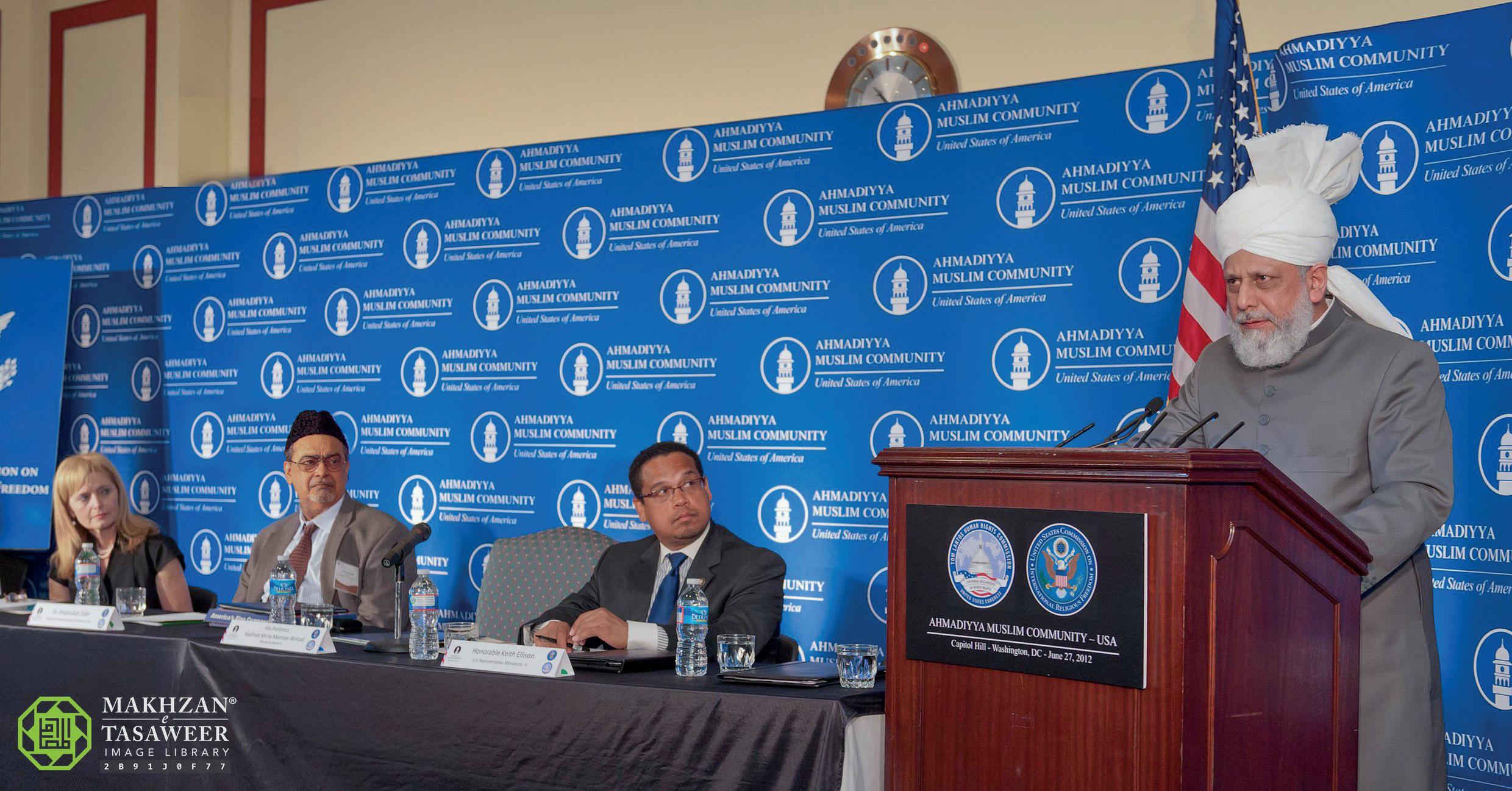
29 June
29 June 1931: On this day,
Friday 23 June 2023 | AL HAKAM 4
Hazrat Khalifatul Masih V delivering the keynote address titled The Path to Peace – Just Relations between Nations at Capitol Hill, Washington DC.
100 Years Ago...
Hazrat Musleh-e-Maudra arranged a gathering for extended family members in connection with the completion of the first reading of the Holy Quran by seven of his children. Huzoorra also wrote a poem for this occasion paying gratitude to Allah. (Tarikh-eAhmadiyyat, Vol. 5, p. 285)
29 June 1938: On this day, Hazrat Musleh-e-Maudra sent his
Lectures at Spiritual Hall and American Indian Association, and new opportunities for tabligh
Al Fazl, 11 June 1923

Lecture in the Spiritual Hall
Last week, another four individuals joined the Ahmadiyya Jamaat. The work of talimo-tarbiyat [edification and moral training] is increasing by the day. Arabic lessons are being held twice a week, i.e., Monday and Wednesday. We have just started them, and people are showing great interest. On the other hand, the series of daily meetings inside and outside of the [mission] house is being held on a regular basis.
This week, Hazrat Mufti Sahibra delivered four lectures. He gave a lecture at the Spiritual Hall on Thursday. Allah the Almighty has blessed him with a special gift. No matter what the subject of the lecture is, somehow the message of Islam and Ahmadiyyat emerges as its central theme. The gathering consisted of prominent people. It had a positive impact on them. After the lecture, the moderator suddenly asked me to address briefly, so I also said a few words.
Islam and Christianity
son, Mirza Mubarak Ahmad Sahib, to Egypt so he could acquire knowledge of Arabic and excel in his experience of agriculture in the land of Egypt. On this occasion, Huzoorra wrote down and highlighted some important matters and gave some advice to Mirza Mubarak Ahmad Sahib, which has been recorded on pages 485 to 490 of the seventh volume of Tarikh-e-Ahmadiyyat
Among many other important matters, Huzoorra mentioned the importance of offering prayer at its prescribed time and in congregation.
29 June 1955: On this day, Hazrat Musleh-e-Maudra arrived in the Netherlands. It was his second European tour, the first being in 1924 to deliver a lecture at the Wembley Conference on Living Religions. One of the purposes this time was to seek medical treatment. (Tarikh-e-Ahmadiyyat, Vol. 16, p. 535)
The jalsa, which takes place on Sundays from 11am to 2pm was held according to the schedule. Around 35 people were present at this gathering. Apart from general advice on talim-o-tarbiyat, Hazrat Mufti Sahibra gave an overview of Islam in his sermon. After the sermon, I gave a short speech at his request.
Then, Hazrat Mufti Sahibra delivered a lecture at an educational society at 3:30pm. Its topic was Islam, Christianity and People of Colour. He lectured continuously on the aforementioned subject for an hour. In particular, he emphasised that the world of today is actually following the rules of Islam and abandoning Christianity. Hazrat Muftira Sahib shed light on matters such as self-protection through nikah [marriage], monetary exchange dealings, social norms, administration and governance, talim-otarbiyat, kindness towards each other, etc., and the mutual relations of mankind. This was a special lecture of the highest quality. The number of participants was above 80. The hall was filled to capacity.
After the lecture, a long session of questions and answers took place, which continued till 6pm. This lecture had a profound impact, and it is hoped that many promising people will benefit from it by the grace of Allah the Almighty. An elderly and well-educated friend got up at the end [of the session] and expressed his gratitude in such a way that we hope he will soon accept Ahmadiyyat, insha-Allah. He openly said that, “Christianity has kept
us in the dark till today, and now if we can benefit from anything in the world, it is Islam that has been presented by the Mufti.” Since a lot of different types of questions were asked during the session, this friend took some of his own people to task that by asking irrelevant questions, they were depriving themselves of hearing other beneficial things. Apart from others, this friend and his wife expressed their desire to participate in our next gathering.
Lecture at the American Indian Association
At 8pm on the same day, Hazrat Mufti Sahibra had a lecture at the American Indian Association, which was located at an hour’s distance by tram [from the place where he delivered his previous lecture]. There, he gave a lecture for an hour on the work that had already been done and was being carried out in America, and also shed light on Islam and Ahmadiyyat. Thereafter, the questions and answers session continued for a long time. Here too, the number of participants was not less than 40, and all were Indian gentlemen. Some of them showed great interest in the Jamaat. There were only two Muslims in the gathering, and the rest of them were Hindus. Their president was also a Hindu gentleman, who was very kind, friendly, and civilised. After the end of the lecture and the questions and answers session, he precisely thanked Hazrat Mufti Sahibra in the most suitable manner.
Superstitions and the West

Here [in America], some people who are against the idea of the number “13” being unlucky are considered to have a very brave heart and moral strength. The number 13, 13th day [of the month], or whatever thing the number 13 is applied to, is considered
a bad omen. Consequently, a person who does not acknowledge the number 13 as an unlucky number is rarely found here. If someone opposes this idea, their names are certainly mentioned in the newspapers. This is the state of current enlightenment.
Lord Carnarvon, who recently discovered Tutankhamun’s tomb, has passed away. Everyone here believes that the king of Egypt, whose tomb he helped discover, killed him. He had an American friend and colleague, who was also ill. His present condition is also very critical. Consequently, the rich people here, whose homes are filled with the ancient relics of the world, are taking out Egyptian monuments and sending them to museums to protect themselves from evil spirits. Moreover, in the homes of some people, such feats are being attributed to these objects that one wonders how these people, who claimed to be the conquerors of all sciences, have become so superstitious that if something moves due to the wind at night, it is considered to be a ghost.
Along with all the aforesaid things, the demonstration of something truly “magical” is also witnessed here:
Four-story houses are detached from the foundations, lifted safely from one place, transported to another place at a distance of many miles, and installed there. During this entire process, there is no disruption, and not even a brick leaves its place. Hence, this worldly progress is also going on simultaneously, but the belief in ghosts is on the rise as well.
Muhammad Din, Chicago, USA, 18 April 1923.
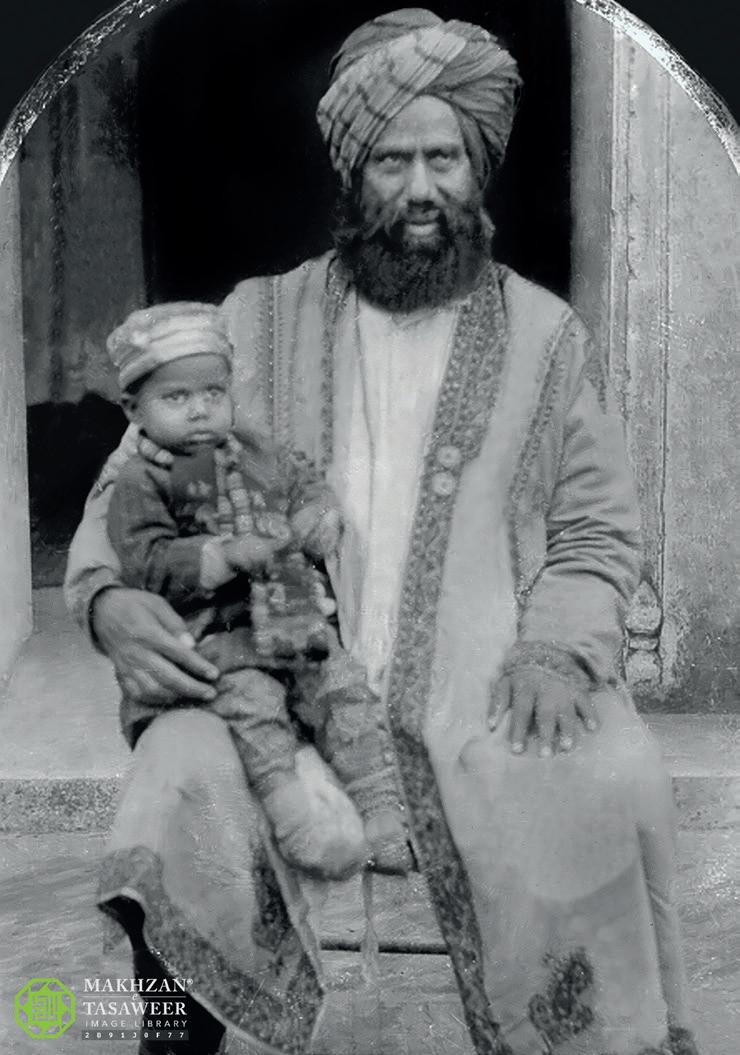
5 AL HAKAM | Friday 23 June 2023
Hazrat Maulvi Muhammad Dinra (1881-1983)
23 - 29 June
(Translated by Al Hakam from the original Urdu, published in the 11 June 1923 issue of Al Fazl)
Hazrat Hakim Maulvi Noor-ud-Deen with his son, Abdul Hayy Sahib.
Map of USA | Pxfuel
Names of Allah
20-34
‘Call on Him by these’
20. Yā Rabb - O Lord! - بر اي
Meaning
The name ar-Rabb means Lord, Possessor, or Owner. It also means Fosterer, Nourisher, or Completer, and The One Who brings things to a state of completion by degrees. (Lane’s Lexicon, Root: بر, Entry: بر; (Friday Sermon, 17 November 2006, Khutbat-eMasroor, Vol. 4, pp. 575-577)
Similar Names
Ar-Rabb (The Lord) and al-Mālik (The Master) are synonymous in their meanings of “Possessor” and “Owner.” (Lisan al-‘Arab, Ibn Manzur, Root: ببر, See “

This name is also mentioned under asSamad (The Besought of All).
Use in Prayer
The meaning of “One who brings things to a state of completion by degrees” in ar-Rabb is especially relevant to our spiritual progress. Many failures related to prayer are because of our impatience and going to extremes.
Our lower self is impatient; it either wants to become a saint overnight or it wants to despair and give up. (Ahmadi aur Ghayr Ahmadi mein Farq, Ruhani Khazain, Vol. 20, p. 484; Malaikatullah, Anwar-ulUlum, Vol. 5, p. 550) If we find ourselves overly motivated, the name ar-Rabb (The Lord) reminds us that no matter how much we pray within a certain period of time, the lordship of Allah Almighty will only nourish us with gradual and natural progress. Allah’s lordship (rubūbiyyah) means no one can become a saint overnight. Rather, there is a stage-by-stage process. On the other extreme, if we find ourselves despairing, the name ar-Rabb (The Lord) reminds us that Allah Almighty is still just as ready to accept our prayers as He was when we were feeling overly motivated. The nourishing lordship (rubūbiyyah) of Allah Almighty is there for anyone who continues to pray when they think it isn’t worth it. When we say Yā Rabb (O Lord!), we pray to Allah Almighty, knowing that He spiritually nourishes us by degrees, similar to how He physically nourishes us.
21. Yā Samad - O Besought of All!
Meaning
The root of samad means to have recourse to someone. As-Samad is the Chief to Whom we have recourse for our needs and without
Whom nothing is accomplished. (Lisan al‘Arab, Ibn Manzur, Root:
Lane’s Lexicon, Root:
Similar
, See “
, Entry:
,
)
As-Samad (The Besought of All) and arRabb (The Lord) are synonymous in their meaning of “chief.” (Lisan al-‘Arab, Ibn
Meaning
The root of ghaniyy means being free from want, or being wealthy. Al-Ghaniyy means He Who has no need of anyone in anything. (Lane’s Lexicon, Root: ىنﻏ Entry: ىنﻏ ،ىنﻏ)
Similar Names
A person who is ghaniyy is wealthy and free of want or need from people. He is independent of people. However, a person who is a malik (king) is connected with people as their king. Although he is also wealthy and free of want or need from people, he has made himself responsible for taking special care of them as their king. People have expectations of their king that they don’t have of a wealthy person.
Al-Ghaniyy (The Self-Sufficient) and al-Malik (The King) are similar in that both lack for nothing. The difference is that Al-Malik (The King) also means that everyone needs Him. Al-Malik (The King) includes the meaning of al-Ghaniyy (The Self-Sufficient). (The Ninety-Nine Beautiful Names of God, al-Ghazali, pp. 25, 160)
This name is also mentioned under alWājid (The Wealthy) and al-Mughnī (The Enricher).
Use in Prayer
we pray, the name al-Ghaniyy (The SelfSufficient) reminds us that Allah Almighty is under no obligation to accept our prayers, and we are entitled to nothing.
When we say Yā Ghaniyy (O SelfSufficient!), we pray to Allah Almighty knowing how insignificant we are and that Allah Almighty is completely independent of us.
23. Yā Wājid - O Wealthy! - دﺟاو
Meaning
The root of wājid means rich and without want. (Lane’s Lexicon, Root: دجو Entry: دجو دجاو,) Al-Wājid means The Wealthy.
Similar Names
Al-Wājid (The Wealthy) and al-Ghaniyy (The Self-Sufficient) are synonymous. Both refer to Allah Almighty as being SelfSufficient. (Lisan al-‘Arab, Ibn Manzur, Root: وجد) When contrasted, the difference is that the root of ghaniyy has a greater emphasis on self-sufficiency, whereas the root of wājid has a greater emphasis on being wealthy.
Use in Prayer
In some Quranic commentaries, asSamad (The Besought of All) is defined as Ghaniyy (Self-Sufficient). However, as-Samad (The Besought of All) does not just mean the One who is independent of everyone (ghaniyy), it also means everyone is dependent on Him. (Tafsir-e-Kabir, Vol. 10, p. 534)
The names al-Mughnī (The Enricher), ar-Razzāq (The Great Sustainer), and alMuqīt (The Giver of Nourishment) focus on Allah Almighty and what He provides. However, the name as-Samad (The Besought of All) focuses on us and how we depend on being provided for. As-Samad (The Besought of All) describes how Allah Almighty is the One on whom we depend completely.
Use in Prayer
The name as-Samad (The Besought of All) reminds us that nothing can be accomplished without Allah Almighty. When we say Yā Samad (O Besought of All!), we are reminded that we only have recourse to Him, and we helplessly pray that He fulfils our every need.
22. Yā Ghaniyy - O Self-Sufficient!
The Holy Prophetsa prayed with the name alGhaniyy (The Self-Sufficient) in mind at the Battle of Badr. He was asked what the need was for his fervent weeping and begging when victory had already been promised. The Holy Prophetsa replied, ‘God is Ghaniyy (Self-Sufficient).’ That is to say, perhaps hidden conditions lay beneath the surface of this divine promise. (Malfuzat, Vol. 1, p. 10) Although Allah Almighty loved the community of Muslims more than anything else in this world, the Holy Prophetsa knew that Allah Almighty is Self-Sufficient and not in need of anybody. If the Muslims had not met His standard, He could allow them to be wiped out and then raise a people who would meet His standard. When we pray, the name al-Ghaniyy (The Self-Sufficient) inspires fear because we bring to mind how Allah Almighty has no need for us. If He has taken special care of us as our Malik (King), it is His special mercy. Otherwise, He is alGhaniyy (The Self-Sufficient), and we can be wiped out like so many people before us, and it would be no loss to Him.
Since Allah Almighty is Self-Sufficient (Ghaniyy), our prayers must be filled with weeping, sincerity, and heartfelt anguish to attract His grace. Otherwise, He does not pay any attention. (Aina-e-Kamalat-e-Islam, Ruhani Khazain, Vol. 5, p. 349; Nusrat-ulHaqq, Ruhani Khazain, Vol. 21, p. 33) When
When we say Yā Wājid (O Wealthy!), we pray to He who is the only possessor of every concept of abundance and wealth, and we pray that He grants us abundance.
24. Yā Mughnī - O Enricher!ﻰﻨﻐم اي Meaning
Al-Mughnī is The Provider of the Means of Sufficiency. (The Holy Quran with English Translation and Commentary, p. cccxxix) alMughnī means He who satisfies, or contents, His servants. (Lane’s Lexicon, Root: ىنﻏ Entry: نﻐم)
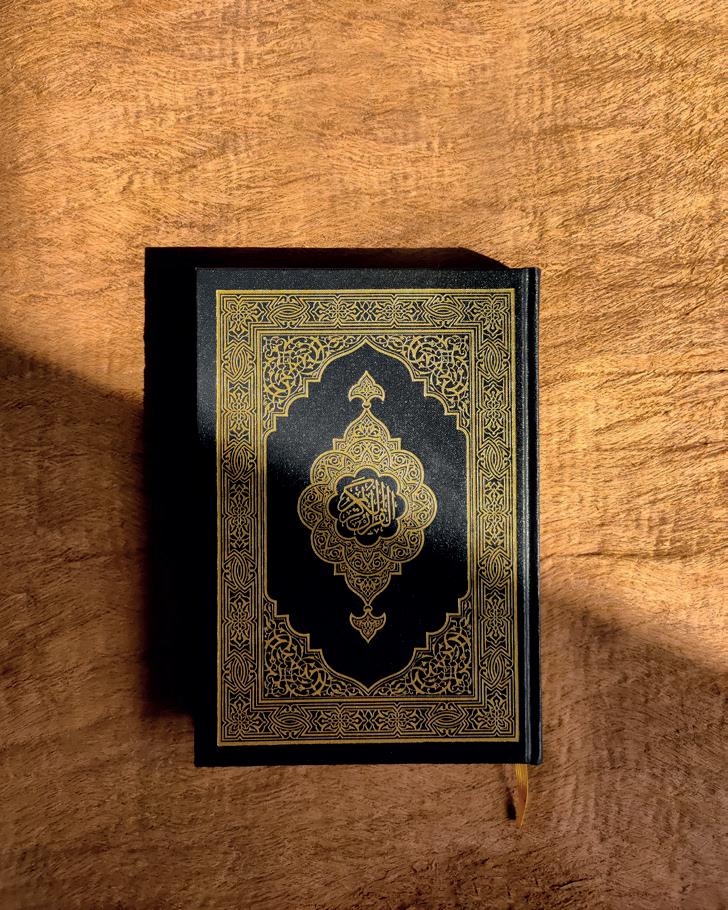
Similar Names
Al-Ghaniyy (The Self-Sufficient) and alMughnī (The Enricher) come from the same root.
Use in Prayer
The Holy Prophetsa taught someone in debt to pray, “Make me independent (aghninī) of all those besides You.” (Jami’ at-Tirmidhi, Kitab ad-da‘wat ‘an rasulillahsa, Hadith 3563)
If we are in debt, our dependency on people is a burden we constantly feel weighed down by. When we say Yā Mughnī (O Enricher!), we pray to be made ghanī, which is to be independent and free of need, and to be sufficed and content.
However, true self-sufficiency does
Friday 23 June 2023 | AL HAKAM 6
Rizwan Khan Missionary, USA
وه ،لجو �� هللا وه :برلا هکلام يأ ءي� ل� بر”)
- دﻤﺻ اي
ar-Rabb, as-Samad, al-Ghaniyy, al-Wājid, al-Mughnī, ar-Razzāq, al-Muqīt, al-Qādir, al-Qadīr, al-Muqtadir, ad-Dārr, an-Nāfi’, al-Qawiyy, Dhul Quwwah, al-Matīn
عاطملا ديسلا دصق� يأ ﺞﺋاوحلا يف هيلإ دمصي يذلا :ليقو ،رمأ هنود ىضق� ال يذلا”;
دمص
دمص
دمص
دمص
Names
Manzur, Root: ببر, See “،كلاملا ىلع ةﻐللا يف قلطي برلا معنمـلاو ،ميقلاو ،ي رمـلاو ،ربدمـلاو ،ديـسلاو”)
- ﻰﻨﻏ اي
اي
Holy Quran, Sidik Kurniawan | Pexels
not come from riches. As long as a person is materialistic, he is always a slave to this world, and no amount of wealth will ever make him truly self-sufficient. The Holy Prophetsa said,
“Wealth (al-ghinā) does not lie in the abundance of worldly goods; rather, wealth (al-ghinā) is feeling sufficiency (ghinā) in the soul.” (Sahih al-Bukhari, Kitab ar-riqaq, Bab al-ghina ghina n-nafs)
When we pray, the name al-Mughnī (The Enricher) reminds us that Allah Almighty is not just al-Ghaniyy (Self-Sufficient) Himself, but He has the power to make us ghaniyy (self-sufficient). He has the power to free us from dependency on anyone else and dependent on Him alone. When we say Yā Mughnī (O Enricher!), we pray for sufficiency in the soul.
25. Yā Razzāq - O Great Sustainer!
- قازر اي
Meaning
The root of razzāq refers to the means of subsistence. Ar-Razzāq means The Supplier of the means of subsistence. (Lane’s Lexicon, Root: قزر, Entry: قزارلا ،قزر; Friday Sermon, 6 June 2008, Khutbat-e-Masroor, Vol. 4, pp. 221-229)
Similar Names
This name is also mentioned under al-Muqīt (The Giver of Nourishment).
Use in Prayer
There is a proverb, ‘Give a man a fish and you feed him for a day; teach a man to fish and you feed him for a lifetime.’ The name ar-Razzāq (The Great Sustainer) brings to mind the One who is not just The Giver of sustenance but the One who is The Giver of the means of sustenance. When we say Yā Razzāq (O Great Sustainer!), we ask Allah Almighty for the means of subsistence.
26. Yā Muqīt - O Giver of Nourishment, O Powerful! - تيقم اي
Meaning
The root of muqīt means to feed, nourish, or sustain. It also means having the power to do something. Al-Muqīt means The Possessor of Power as He gives everyone food. (Lane’s Lexicon, Root: توق, Entry: ،توق تيقم ،توقا)
Similar Names
The meaning of giving food in al-Muqīt (The Giver of Nourishment) is similar to arRazzāq (The Great Sustainer). The difference
is that al-Muqīt is specific to nourishment, whereas ar-Razzāq is broad and applies to all means of sustenance. (The Ninety-Nine Beautiful Names of God, al-Ghazali, p. 109)
Al-Muqīt (The Giver of Nourishment) also has the meaning of al-Hafīz (The Preserver) and al-Muqtadir (The Omnipotent). (Lisan al-‘Arab, Ibn Manzur, Root: توق, See “
Use in Prayer
When we pray, the name al-Muqīt (The Giver of Nourishment) brings to mind how vulnerable our body is and how quickly we would be in a crisis if our access to food was disrupted. After a few days without eating, all our luxuries would give us no comfort, and every one of us would happily trade away our most expensive possessions for just some food. When we say Yā Muqīt (O Giver of Nourishment!), we remember how fragile our body is, and we seek nourishment from Allah Almighty.
27. Yā Qādir - O Possessor of Power! - رداق
28. Yā Qadīr - O All-Powerfulريدق
29. Yā Muqtadir - O Omnipotent! -
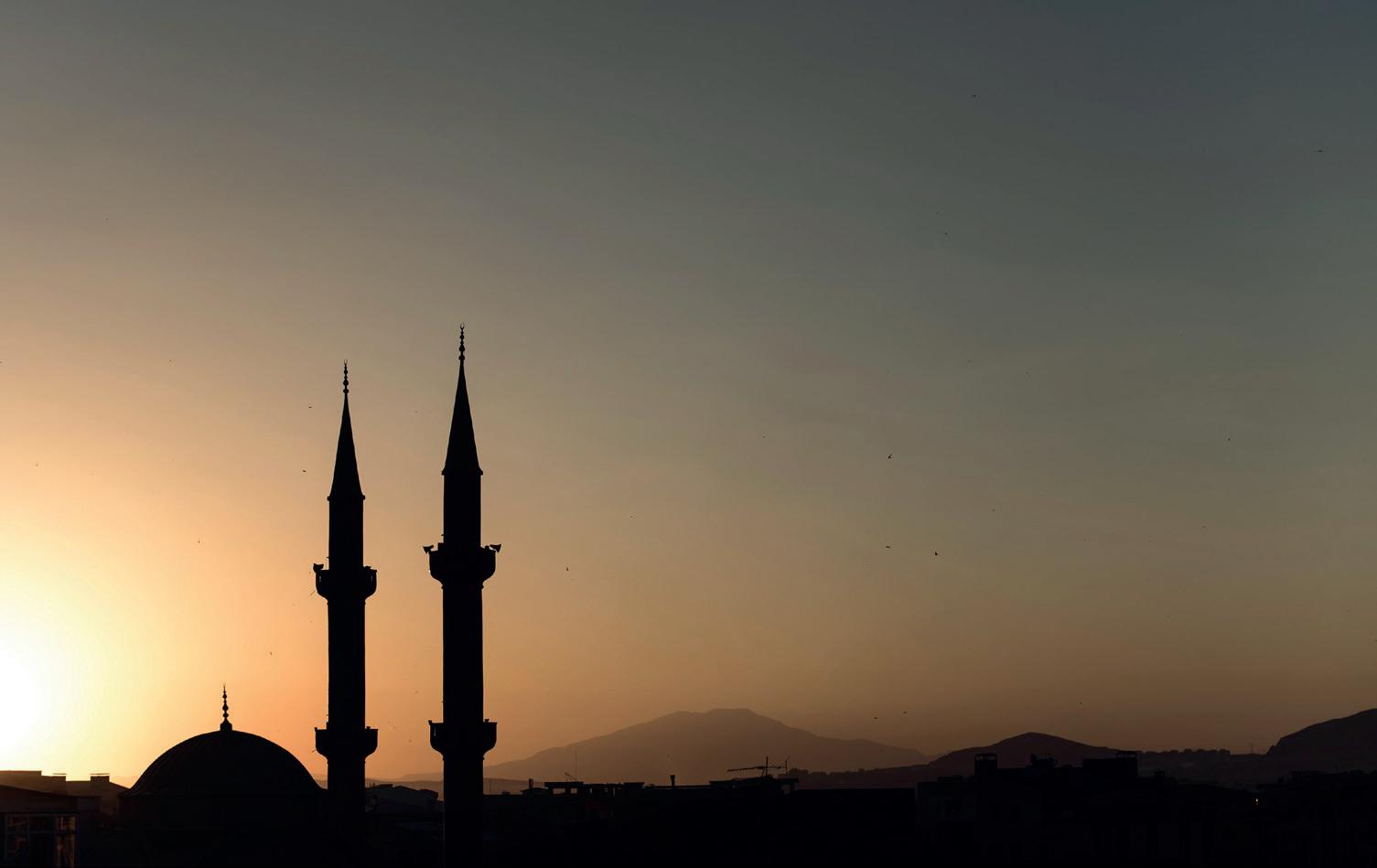
Meaning
The word Qādir means decreeing or deciding. It also means possessing power or ability. The words Qādir, Qadīr and Muqtadir are synonymous, with Qadīr being in the intensive form and Muqtadir being more intensive. (Lane’s Lexicon, Root: ردق, Entry: رداق)
The names al-Qādir (رداقلا), al-Qadīr (ريدقلا), and al-Muqtadir (ردتقملا) seem synonymous, but the distinct way each is used in the Holy Quran makes their differences clear. Al-Qādir (The Possessor of Power) is usually used when Allah Almighty brings people to attention through a special manifestation of His power that is outside what they are accustomed to. Al-Qadīr (The All-Powerful) is the broadest in its application and is usually used about the power of Allah Almighty manifested through His established laws. Al-Muqtadir (The Omnipotent) is usually used where opposition is mentioned. When opponents try to overpower Divine decree, the power
of Allah Almighty that descends at such times to protect His beloveds and destroy His enemies is a manifestation of alMuqtadir. (Friday Sermon, 10 January 1986, Khutbat-e-Tahir, Vol. 5, pp. 35-36)
Similar Names
This name is also mentioned under alQawiyy (The Strong), al-Qahhār (The Most Supreme), and al-Majīd (The Ever-Noble).
Use in Prayer
When we say Yā Qādir (O Possessor of Power!), we ask Allah Almighty for a special manifestation of His power.
Whenever we observe the power of Allah in an aspect of the general laws of nature, we bring to mind the limitless power of al-Qadīr (The All-Powerful). When we say Yā Qadīr (O All-Powerful) and pray that we always act in accordance with His established power and decree, never against it.
When we say Yā Muqtadir (O Omnipotent!), we pray that Allah Almighty manifests His power in support of His servants and against His enemies.
The word qādir is related to power and to deciding. We seek help from Allah Almighty in the istikhārah prayer with the words, كتردقب كردقتسأو, “I seek power (astaqdiru) from Your power.” (Sahih alBukhari, Kitab at-tahajjud, Bab ma ja’a fi t-tatawwu‘i mathna mathna, Hadith 1166)
The word astaqdiru (ردقتسأ) also means to ask for a decision and decree. (Lane’s Lexicon, Root: ردق, Entry: ردقتسا) When we say Yā Qādir (O Decreer!), we let go of our right to decide something and pray that Allah Almighty decides what is best for us.
30. Yā Dārr - O Harmer! - راض اي
31. Yā Nāfi’ - O Benefactor! - عفان اي
Meaning
The root of dārr means to harm, hurt, or damage. The root of nāfi’ means to be profitable, useful, or beneficial. Ad-Dārr and an-Nāfi’ mean He Who harms and He Who benefits whoever He wills. (Lane’s Lexicon, Root: رض, Entry: راض ،رض; Lane’s Lexicon, Root: عفن Entry: عفن; Friday Sermon, 24 April 2009)
Similar Names
Ad-Dārr (The Harmer) and an-Nāfi’ (The Benefactor) are opposites.
Use in Prayer
Anyone who believes in God must believe in His power to cause harm and benefit. Without these attributes, belief in such a concept of God is of no use. The Holy Quran condemns the idolator and says, “He calls beside Allah on that which can neither harm (yadurr) him, nor benefit (yanfa’u) him.” (Surah al-Hajj, Ch. 22: V.13) The names ad-Dārr (The Harmer) and an-Nāfi’ (The Benefactor) tell them to be sensible enough to pray to a Being who has the power to do harm or give benefit in this world.
These names also remind us that we should not insistently pray for something materialistic that, if given to us, could ultimately be harmful to us. Allah Almighty sometimes accepts such prayers to teach a lesson. We should be cautious in our prayers because we address the One Who has the power to harm and benefit whoever He wills.
Also, we should remember that Allah
Almighty never initiates harm to anyone; He reciprocates harm. The Holy Prophetsa said, “Whoever harms (dārr) others, Allah will harm (dārr) him.” (Jami’ at-Tirmidhi, Kitab al-birri wa s-silati ‘an rasulillahsa, Bab ma ja’a fi l-khiyanati wa l-ghishsh; Sunan Abi Dawud, Kitab al-aqdiyah, Bab fi l-qada’) When such harm comes from Allah Almighty, it is so encompassing that there is no escape. Allah Almighty says, “And if Allah touch you with affliction (durr), there is none that can remove it but He.” (Surah al-An’am, Ch.6: V.18) When we say Yā Dārr (O Harmer!) and Yā Nāfi’ (O Benefactor!), we pray that Allah Almighty save us from the harm we could bring on ourselves from Him, and we pray that He shows beneficence to us.
32. Yā Qawiyy - O Strong! - ىوق اي
33. Yā Dhal Quwwah - O Possessor of Strength! - ةوقلا اذ اي Meaning
The root of qawiyy has the meaning of strength and force. (Lane’s Lexicon, Root: ىوق, Entry: ةوق) al-Qawiyy means The Strong, and Dhul Quwwah means The Possessor of Strength. Names that start with “Dhū” (Possessor of) emphasise the attribute more than the possessor of the attribute. The fa’īl (ليعف) form of a word is more intensive than when the attribute is expressed with the word “dhū” (Possessor of). For example, Allah Almighty says, “Above every possessor of knowledge (dhū ‘ilm) is One possessing greater knowledge (‘alīm).” (Holy Quran, Yusuf 12:77) This verse shows that the word ‘alīm is more exclusive and intensive than the words dhū ‘ilm. The same difference exists between Al-Qawiyy (The Strong) and Dhul Quwwah (Possessor of Strength, AlJalīl (The Majestic) and Dhul Jalāl (Possessor of Majesty), Al-Karīm (The Generous) and Dhul Ikrām (Possessor of Bounty), and ArRahīm and Dhur Rahmah (Possessor of Mercy). [Note: “dhū” and “dhī” are both Arabic words that indicate possession. Both are used depending on the grammatical gender and the consonantal environment of the word that follows.]
Similar Names
Al-Qādir (The Possessor of Power) and alQawiyy (The Strong) seem similar, but there is a difference. The root of qādir refers to ability; the emphasis is on possessing power. (Lane’s Lexicon, Root: ردق , Entry: ردق) However, qawiyy refers to the strength to use that ability. For example, if hunger has weakened someone, he has not lost his qudrah (possession of his abilities); he has only temporarily lost the quwwah (strength) to use his abilities.
The opposite of strength (ةوف) is weakness (فعض), (Lane’s Lexicon, Root: ىوق, Entry: ةوق) and the opposite of ability (ةردق) is inability (زجع). (Al-Mufradat, al-Rāghib, Root: زجع) The name al-Qādir (The Possessor of Power) emphasises possessing limitless ability, whereas Al-Qawiyy (The Strong) emphasises the limitless strength and force to use that ability.
This name is also mentioned under alMatīn (The Firm), al-Qahhār (The Most Supreme), and al-‘Azīz (The Mighty).
7
HAKAM | Friday 23 June 2023
AL
وه ،تيقملا :ىلاعت هللا ءامسأ يفو ردتقملا :ليقو”)
،ظيفحلا
اي
اي
ردتقم اي
Continued on page 9 >> Ali Arif Soydaş | Unsplash
M Adam Ahmad Al Hakam
The prophets of Allah the Almighty have strong jealousy [ghayrah] for the honour of His religion and messengers. The great responsibility of upholding the truth drives their unwavering devotion to the glory of faith and the preservation of Divine revelations. Moreover, God’s messengers are stalwartly committed to safeguarding the honour of other prophets, as they are well aware of the fact that any attempt to disrespect or discredit the chosen ones of Allah the Almighty would ultimately tarnish prophethood as a whole and undermine their mission of guiding humanity.
In this age, Prophet Ahmadas was sent by God Almighty as the Latter-Day Messiah to revive faith and bring back its former glory. Throughout his life, the Promised Messiahas made every effort to purify Islam of superstitions, innovations, false practices, etc. that had been later added to it and showed great vigilance in guarding its honour.
Hazrat Maulvi Abdul Karim Sialkotira writes:
“There is only one thing that affects, rouses, and angers His Holinessas [the Promised Messiah], and that is an affront to the sacred things of Allah, or a dishonour of the sacred Signs of Allah. Once His Holinessas said: ‘It would be easier for me to see my property destroyed and my children cut to pieces before my eyes, than to see the Faith dishonoured and seen with contempt, and then for me to do nothing.’
“During the days when the hurtful and vile book, [Ummahatul Mumineenn] –which was nothing more than injury and offence, and presented not a single rational argument with – was published and received, on reading this book His Holinessas felt such grief that he verbally expressed: ‘Bitter has my comfort become.’” (Life of the Promised Messiahas, pp. 92-93)
Righteous indignation for honour of faith and Prophet Muhammad
This series, Zikr-e-Habib, explores the life of Hazrat Mirza Ghulam Ahmadas, the Promised Messiah and Mahdi, and his sayings, shedding light on his noble character and the impact of his teachings on his followers and the world at large.


Maulvi Muhmmad Hussian Batalavi, who later became a stark opponent of the Promised Messiahas, also testified to the fact that Prophet Ahmadas “safeguarded the honour of Muslims” and challenged the enemies of Islam with compelling arguments. Highlighting his review of the Promised Messiah’sas book, Barahin-eAhmadiyya, Iain Adamson writes:
“The first two volumes of Barahin-eAhmadiyya appeared in 1880. The response was spectacular. Muhammad Hussain, his former schoolmate at Batala, was now a leader of the Ahl-e-Hadith sect and editor of a newspaper entitled Ishaat-us-Sunnah He wrote a massive two-hundred-page review which was spread over six issues.
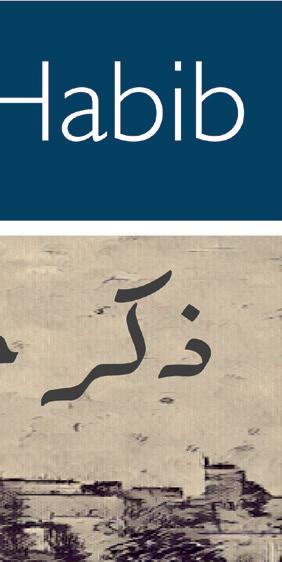
“He, first of all, drew attention to the fact that he had known Ahmad since boyhood.
[…]
“He concluded with the following appeal:
“The excellence of this book and its benefits for Islam will be recognised by those who read it with an open mind. […] Therefore, acting up on the principle that the only return for beneficence is beneficence, we wish to point out that helping the publication of this book through a contribution towards the cost of printing is a duty laid down on the entire Muslim community.
“The author of Barahin-e-Ahmadiyya [the Promised Messiahas] has, by writing this book, safeguarded the honour of the Muslims and has challenged the opponents of Islam emphatically and forcefully. He has announced to the whole world that anyone who doubts the truth of Islam should come to him and witness the intellectual and spiritual proofs based upon the Quran and the miraculous manifestation of the prophethood of Muhammad[sa] in support of the truth of Islam.” (Ahmad[as], The Guided One, pp. 77-79)
Shedding light on his advent and the state of Islam, The Promised Messiahas says:
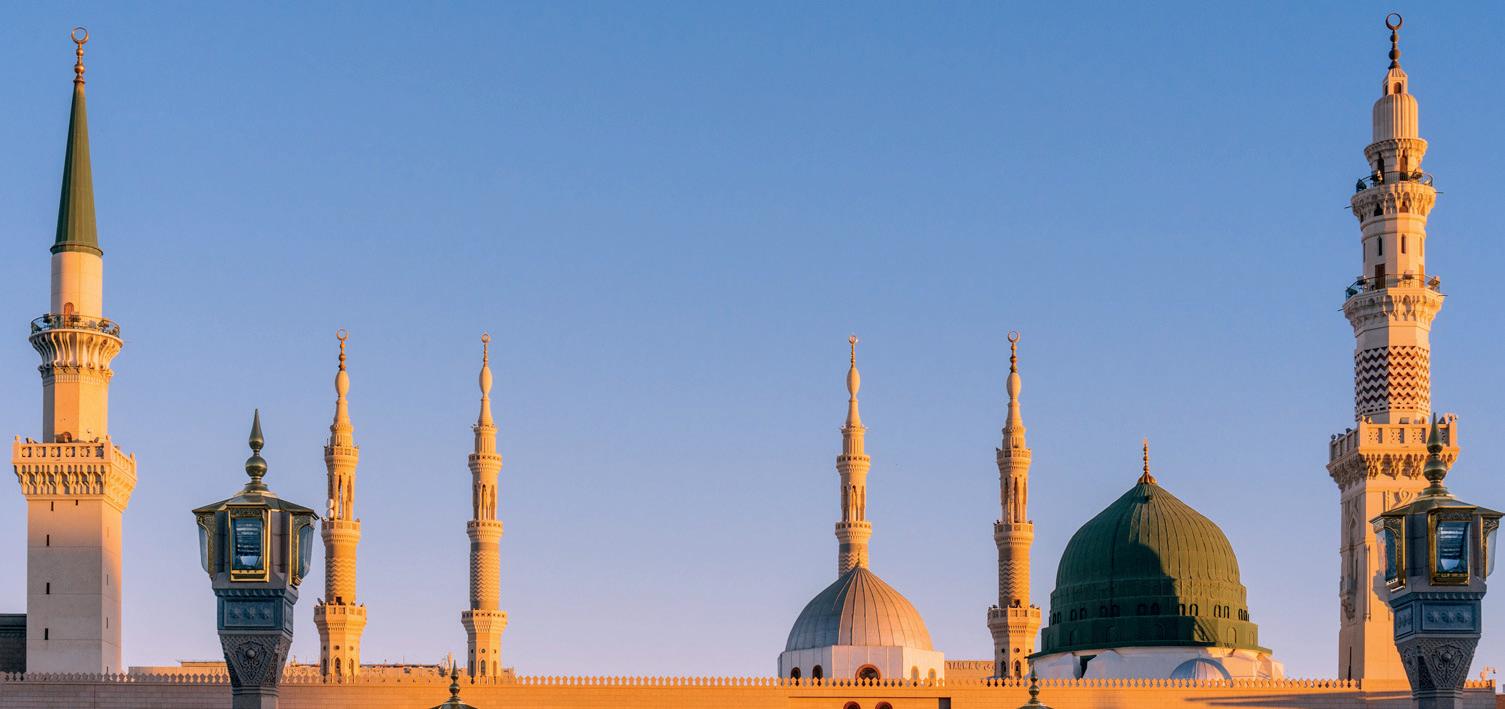
“At the present time, Islam is being attacked, as in the case of the ‘People of the Elephant’. The Muslims suffer from many weaknesses. Islam is deprived and the ‘People of the Elephant’ are in strength. But even now, Allah the Exalted desires to manifest a similar demonstration as in the past. […]
“The very meaning of Islam and faith is to align one’s thoughts and desires with the will of God. God does not care for the honour and dignity of any person who has no indignation and jealousy [ghayrah] for Islam, irrespective of who they may be; such a person is not a practising Muslim.
“Do not view the affairs of God with contempt, and consider worthy of pity those who have rejected the truth on account of prejudice and have said that there is no need for anyone’s advent in this era of peace. Pity be upon them. They do not see how Islam is besieged by its enemies and onslaughts are being waged against it from all directions; the Messenger of Allah, peace and blessings of Allah be upon him, is maligned. Yet, despite all this, they say that there is no need for anyone?” (Malfuzat [English], Vol. 1, pp. 180-181)
This righteous indignation for protecting the honour of Islam was not motivated by his ego or any personal gain, but rather, Prophet Ahmadas was solely focused on fighting against false ideologies that threatened the true essence of faith and the spiritual and moral well-being of mankind. In one of his Persian poems, the Promised Messiahas states:
“If someone assails my honour, my habit – like Yours [God Almighty] – is to be forbearing.
“What am I, and of what worth is my honour? This battle is only for the sake of Your honour.” (Barahin-e-Ahmadiyya, Part V, p. 221)
On the other hand, when God’s prophets go to great lengths for the honour of His faith, Allah the Almighty’s jealousy rises to honour them. The Promised Messiahas said:
“However, it was the grace of Allah the Exalted and His special favour that He honoured me in every conflict and humiliated my enemies and those who sought my humiliation.” (Malfuzat [English], Vol. 10, pp. 197-98)
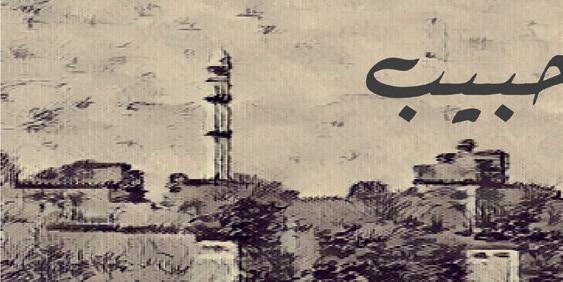
Hazrat Mirza Bashir-ud-Din Mahmud Ahmadra narrated an incident of Allah the Almighty’s jealousy for His servant and the
absolute trust of the Promised Messiahas in Him. Hazrat Khalifatul Masih IIra states:
“God Almighty raised the Promised Messiahas in our midst, and his existence became a manifest sign for us. Whoever sat before him witnessed the verities of the Holy Quran and the Holy Prophetsa, and there remained nothing that would deter such a person from Islam. When a case about Karam Din Bheen was filed against the Promised Messiahas, the magistrate at the time was a Hindu. The Aryas persuaded him to sentence the Promised Messiahas, and he promised them to do so. Khawaja Kamaluddin Sahib became worried when he heard of this. He visited the Promised Messiahas in Gurdaspur, where he was staying during the trial, and stated, ‘Huzooras, I have news of great concern! The Aryas have swayed the magistrate, and he has taken an oath to sentence you.’ At the time, the Promised Messiahas was lying down, he sat up straightaway and stated, ‘Khawaja Sahib! Who can place their hands on the Lion of God? I am the Lion of God; let him try to put his hands on me.’
“Hence, this is precisely what followed. This case was presented in the courts of two magistrates, one after the other, and both of them were severely punished. One of them, who wanted to take action against the Promised Messiahas, was suspended. The other magistrate lost his son, who drowned in a river, and this incident affected him so much that he became partially insane.” (Tafsir-e-Kabir, Vol. 6, p. 359; Friday Sermon, Al Hakam, Vol. 2, Issue 57)
The Promised Messiahas also strived to uphold the dignity of other messengers. In particular, Prophet Ahmadas showed profound jealousy for the honour of the greatest of all the prophets, Hazrat Muhammad al-Mustafa, peace and blessing of Allah be upon him. On one occasion, Prophet Ahmadas said:
“I consider it a part of my faith to honour and revere the Prophets, but my belief in the superiority of the Noble Prophetsa over all the other Prophets, peace be upon them, is the greatest aspect of my faith, and is a part of my very being and fibre. It is not within my power to remove this nature. An unfortunate and blind opponent can say whatever they please. Our Noble Prophet, peace and blessings of Allah be upon him, accomplished such a feat which no one else could have done individually or collectively; this is the grace of Allah Almighty.” (Malfuzat [English], Vol. 3, p. 66)
Hazrat Sheikh Yaqub Ali Irfani Sahibra
Friday 23 June 2023 | AL HAKAM 8
� � � �ا � ت� � ا� � �� � �� �ا �
� � �� � و � ��� � ا� � �و�آ ِ� ز �ا �
Continued on next page >>
Sulthan Auliya | Unsplash
said:
“It is a proven fact about the Promised Messiahas that he had great jealousy for the honour of faith. In particular, Huzooras would become really impatient upon hearing any word of disrespect for the Holy Prophetsa and could not tolerate it at all. There are many incidents in the life of the Promised Messiahas which shed light on this matter.
“The Promised Messiahas stopped seeing his aunt, Bibi Sahib Jan (wife of the late Mirza Ghulam Haider Sahib) and abstained from eating at her house. The reason was simple, she had uttered a slightly disrespectful word that was against the honour of the Holy Prophetsa. In spite of the fact that the Promised Messiahas revered his elders, the aforementioned incident had such an effect on him that his face flushed with anger, and Huzooras even stopped eating [for some time].” (Hayat-e-Ahmad, Vol. 1, Part III, pp. 344-345)
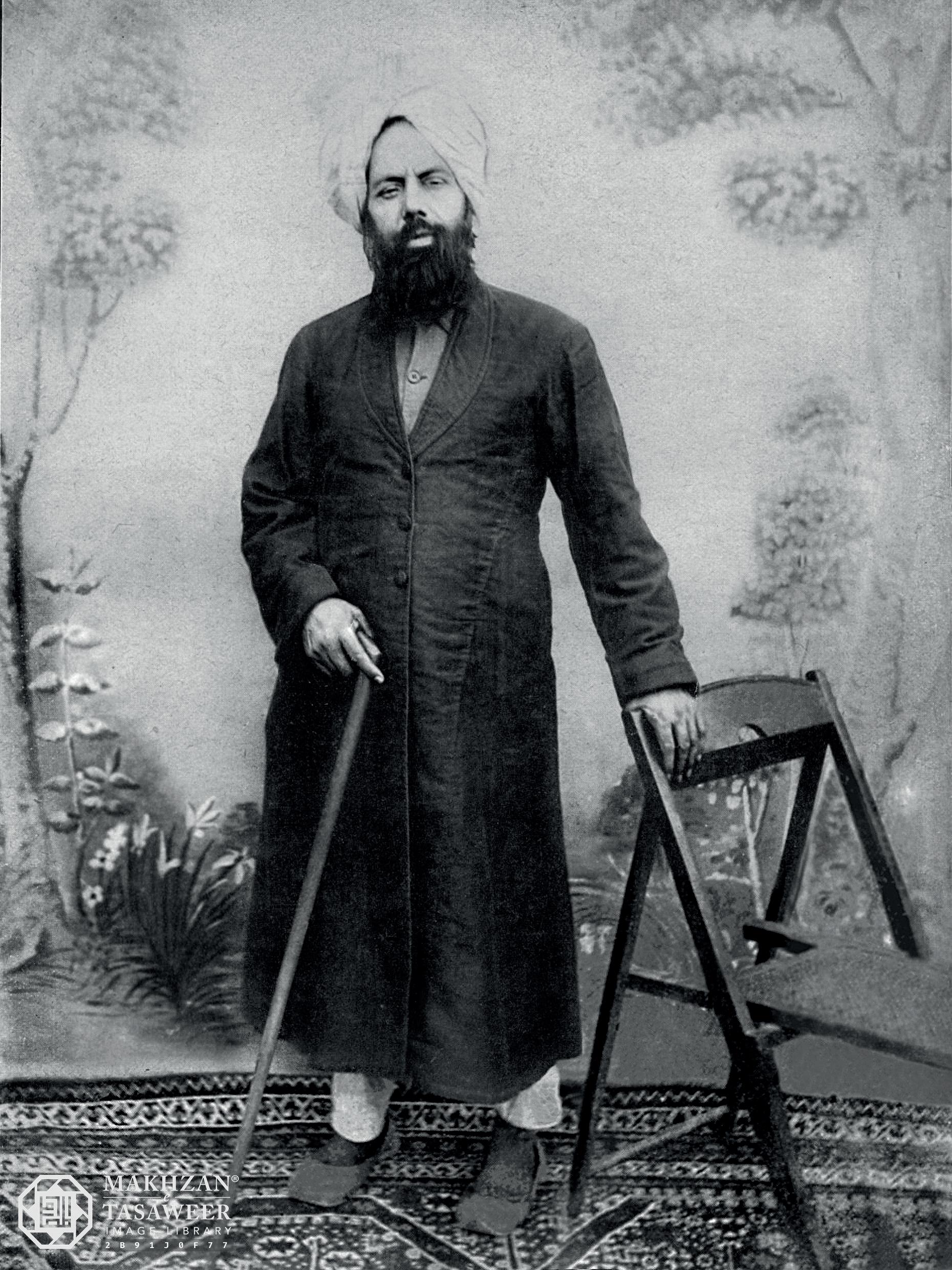
A prominent Arya Samaj leader, Pandit Lekhram was advised by Prophet Ahmadas to refrain from dishonouring the Holy Prophetsa because his attacks on his character were extremely insulting and provocative. However, he did not pay heed and met his demise through Divine wrath.
Once, Pandit Lekhram happened to come across the Promised Messiahas and witnessed his indignation and jealousy for the honour of the Holy Prophet Muhammadsa. The incident is as follows:
“In November 1893, [Hazrat Ahmadas] visited Ferozepur to meet his father-in-law, Hazrat Mir Nasir Nawab Sahibra, who was employed in the canal department since his youth. On his return from there on 14 December 1893, while performing ablution in a mosque near Lahore railway station, the famous Arya Samaj leader, Pandit Lekhram, came before Huzooras and greeted him, but the Promised Messiahas did not respond. He [Lekhram] came from the other side and greeted him [again], thinking that he might not have heard. However, [Huzooras] still did not pay any attention. When Pandit Ji returned disappointed, someone thought that perhaps the Promised Messiahas did not hear Pandit Lekhram greet him. He told Huzooras that Pandit Lekhram had come and greeted him. Upon hearing this, the Promised Messiahas said, with great pride, ‘Is he not ashamed? He insults our master, the Holy Prophetsa, and greets us.’” (Tarikhe-Ahmadiyyat Lahore, Sheikh Abdul Qadir,
pp. 30-31; Al Hakam, 22 July 2022, Vol. 5, Issue 227)
On one occasion, Prophet Ahmadas said:
“He [Lekhram] did not inflict any sort of harm or injury upon my own person directly. He did, however, make insolent attacks against the holy personage of the Noble Messenger, peace and blessings of Allah be upon him, and dishonoured him in such ways that my heart began to palpitate and I was extremely grieved. I presented his [instances of] disrespect and impertinence before God with a broken heart, and as a recompense for Lekhram’s insolence and disrespect, God conferred upon me a prophecy about him. In the very same prophecy, his death, the time of his death, and the manner in which he would die – among other details – were explicitly stated. In the context of this prophecy, there is an illustration of a hand. Then, in the same connection, the following words are mentioned:
‘Fear the sharp sword of Muhammadsa.’
“All this is clearly recorded. Now someone ought to tell me whether it is within the human design and power to foretell of such a happening five years in advance when Lekhram was a young man of merely twenty-four or twenty-five years of age? Of course not. This is an act of God Almighty. This is far beyond and above human power, or human understanding and comprehension.” (Malfuzat [English], Vol. 2, pp. 282-83)
The Promised Messiahas said:
“One ought to reflect that if a disease were spreading in the form of an epidemic, would a doctor seek to cure that disease or would he provide a remedy for some other illness? The Messenger of Allah, peace and blessings of Allah be upon him, has become the subject of extreme mockery. [... Today, Muslims] read and listen to slanderous books and feel no indignation. They cannot even bring themselves to dislike such publications. On the contrary, they oppose, mock, and ridicule the person who has been sent specifically by God to put an end to this calamity and who is possessed with a distinct jealousy for the honour and glory of the Messenger of Allah, peace and blessings of Allah be upon him. May God Almighty Himself grant these people a discerning eye. Amin.” (Malfuzat [English], Vol. 1, pp. 178-179)
Prophet Ahmadas had an unceasing passion for safeguarding the honour of
faith and defending the dignity of the Holy Prophetsa. Thus, we conclude this narration of eternal loyalty to the cause of God Almighty with the following words of the Promised Messiahas:
“The insults that have been offered to Islam and the Holy Prophet, peace and blessings of Allah be on him, the attacks that have been made against Divine Law and the apostasies and heresies that have become widespread, cannot be matched in any other age. Is it not true that in a short while in India alone, a hundred thousand people have become Christians, more than sixty million books have been published in opposition to Islam, people belonging to high families have lost their religion, those who used to describe themselves as the descendants of the Holy Prophet, peace
and blessings of Allah be on him, have put on the garment of Christianity and have become his enemies, and numberless books full of vile abuse against the Holy Prophet, peace and blessings of Allah be on him, have been published?
“My heart cries out with tears that if these people had murdered my children before my eyes, and had cut to pieces my sincere friends, and had killed me with great humiliation, and had possessed themselves of all my property, I would not have been so pained and my heart would not have been so hurt as it has been pained and hurt by the insults offered to the Holy Prophet, peace and blessings of Allah be on him.” (Ainae-Kamalat-e-Islam, Ruhani Khazain, Vol. 5, pp. 51-52; The Essence of Islam, Vol. 1, pp. 320-21)
Use in Prayer
The Holy Prophetsa taught us to say, ةوق الو لوح ا
ا إ, (Sahih al-Bukhari, Kitab al-adhan, Bab ma yaqulu idha sami‘a l-munadi, Hadith 613) meaning that there is no turning from disobedience, nor strength (quwwah) to obey, except by the help of Allah. (Al-Misbah al-Munir, al-Fayyumi, Root: لوح, See “ليق
Lane’s Lexicon, Root: لوح, Entry: لوح)
Although we know that we possess the Godgiven ability (qudrah) to obey, we admit that we are weak and lack the strength (quwwah) to obey. When we say Yā Qawiyy (O Strong!), we beg Allah Almighty, who is the
source of all strength, to give us the strength to use our abilities for good. The Holy Prophetsa taught a companion to pray, ي إ مهللا ي وقف فيعض, “O Allah! I am weak, grant me strength (qawwinī).” (Al-Mustadrak ‘ala alSahihayn, Hakim al-Nishapuri, Kitab aldu‘a, wa al-dhikru al-du‘a alladhi ‘allama buraidah)
In the Holy Quran, Allah Almighty has mentioned His being Qawiyy (Strong) in many verses. In almost all instances, He speaks of the awful end of His enemies, or He gives warnings related to this. (Friday Sermon, 9 October 2009, Khutbat-eMasroor, Vol. 7, pp. 475-484) When we say Yā Qawiyy (O Strong!), we bring to mind the limitless strength of Allah Almighty to
exercise His power, and we pray that He manifests that strength in our support.
34. Yā Matīn - O Firm! - نيتم اي
Meaning
When applied to a person, the word matīn refers to someone who is strong and has firm muscles in his back. Al-Matīn means The Strong and Firm. (Friday Sermon, 16 October 2009, Khutbat-e-Masroor, Vol. 7, pp. 485-494; Lane’s Lexicon, Root: نتم, Entry: نيتم)
Similar Names
Al-Qawiyy (The Strong) and al-Matīn (The Firm) are synonymous. When contrasted, the difference between them is that a person
being qawiyy (strong) means he has an effect and influence on others, while a person being matīn (firm) means he is not affected and influenced by others. (Kashf al-Ma’na ‘an Sirr Asma Allah al-Husna, Ibn Arabi, (55) Al-Ism: al-Matīn, See “نمو ،رثؤي
ال انيتم هنوك”)
This name is also mentioned under alQahhār (The Most Supreme).
Use in Prayer
When we say Yā Matīn (O Firm!), we bring to mind the unbreakable firmness in the strength of Allah Almighty, and we ask Him to give us firmness and resolve in standing by our principles.
9 AL HAKAM | Friday 23 June 2023
ؐدمحم نارب غيت زا سرتب
هللاب
هللا قيفوتب الإ ةعاطلا ىلع ةوق ا و ةيصعملا نع لوح ال هانعم”;
هنوك نمف
ايوق
رثأتي
Continued
Continued from
<<
from page 7 <<
previous page
Prophets of Allah
John: the harbinger of Jesus
“And We did raise among every people a Messenger”
Jalees Ahmad
Al Hakam
Johnas, known as Yahyaas, was a prophet of God who appeared before Jesusas. He was the son of Zachariahas, the guardian of Maryas. Yahyaas was known as Johnas of the New Testament – cousin of Jesusas. (Five Volume Commentary, Vol.2, p.482) It is said that, “The mother of Maryas (Hanna) and the mother of Johnas (Elizabeth) were sisters.” (The Encyclopedia of Islam, New Edition, 1986, Vol. 11, p. 249)

His name was bestowed upon him by God. (Surah Maryam, Ch.19: V.8) The Holy Quran describes him as “noble and chaste and a Prophet.” (Surah Aal-e-Imran, Ch.3: V.40)
Birth of Prophet Johnas
John’sas birth is considered a miracle, as he was born to a barren mother and an aged father, Zachariahas Zachariahas was told about his birth while he was praying. Narrating this incident, the Holy Quran states:
Johnas and Jesusas
Prophet Johnas, as mentioned above, appeared before Jesusas to serve as a sign in fulfilment of Malachi’s Biblical prophecy
“Behold, I will send you Elijah the
their hearts. The divine will then transferred prophethood to the descendants of Ishmaelas. (Five Volume Commentary, Vol.4, p. 1930)
Was Prophet Johnas martyred?
One distinctive piece of information we find about Prophet Johnas is that God himself named him:

“‘O Zachariah, We give thee glad tidings of a son whose name shall be Yahya. We have not made any one before him of that name.’” (Surah Maryam, Ch.19: V.8)
In light of this, we read in the Five Volume Commentary:
among the views of the classical scholars regarding the murder of Hazrat Yahya and Hazrat Zachariah, peace be upon them, so is there also a difference of opinion in the Jamaat on this among the Khulafae-Ahmadiyyat in light of their reasoning from the verses of the Holy Quran and their interpretation of ahadith
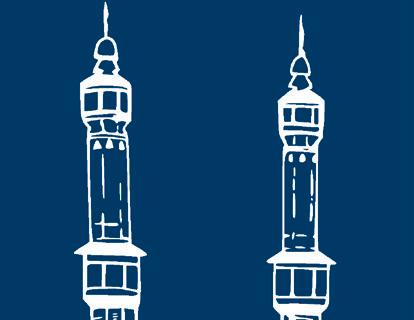
“My view in this regard concurs with the opinion of Hazrat Musleh-e-Maudra
“And the angels called to him as he stood praying in the chamber: ‘Allah gives thee glad tidings of Yahya, who shall testify to the truth of a word from Allah—noble and chaste and a Prophet, from among the righteous.’” (Surah Aal-e-Imran, Ch.3: V.40)
The verse portrays Johnas as a noble and chaste Prophet of God, chosen from among the righteous.
Hazrat Khalifatul Masih IVrh has stated:
“He [Prophet Zachariahas] desired to have a child, but he had so advanced in age that with white hair on his head, it was as if he was all aflame with hoariness, and the wife was not only old but she was barren as well. Thus, this was an example of miraculous birth that, despite both [of these apparent barriers], he was bestowed upon Hazrat Yahyaas [John]. He had developed the desire to have a child after pondering over the circumstances of Hazrat Maryamas who was to show the miracle of the fatherless birth of Hazrat Jesusas.” (The Holy Quran, Urdu translation by Hazrat Khalifatul Masih IVrh, p. 79)
prophet before the great and terrible day of the Lord comes.” (Mal. 4:5)
When speaking of Johnas, Allah states: ايبنو اروصحو اديس
“Noble and chaste and a Prophet.” (Surah Aal-e-Imran, Ch.3: V.40)
“The Quranic expression روصح in the sense of ‘concealer of a secret’ also points to the above description, for Yahyaas (John) was the bearer of the hidden news of the coming of Jesusas.” (Five Volume Commentary, Vol.2, p. 485)

Further, in the Bible, we read:
“I indeed baptise you with water unto repentance: but he that cometh after me is mightier than I, whose shoes I am not worthy to bear: he shall baptise you with the Holy Ghost, and with fire:
“Whose fan is in his hand, and he will thoroughly purge his floor, and gather his wheat into the garner; but he will burn up the chaff with unquenchable fire.
“Then cometh Jesus from Galilee to Jordan unto John, to be baptized of him.” (Mathew, 3:11-13)
Jesusas received baptism from Johnas, and both prophets followed the Law of Moses. Neither of them introduced a new Book or Law. (Five Volume Commentary, Vol.4, p.1935)
John’sas great efforts to assist Jesusas and prepare the Jews for his coming proved futile. As a result, he was imprisoned and killed (Mathew, 14:10), and his people rejected both Johnas and Jesusas. Despite Zachariah’sas prayer, Johnas couldn’t change
“The two words ما�ﻏ and ىيحي used in this verse are very significant. The word ما�ﻏ signifies three periods of one’s life, i.e., childhood, youth, and middle age. Applied to Yahyaas or John it embodied a prophecy that he shall not die in childhood but shall grow up to be a young man before the eyes of his father and shall live up to middle age and so it actually came to pass. Yahyaas lived up to middle age and then was killed by the order of Herod to satisfy the wish of a dancing girl. The word ىيحي literally meaning, ‘he lives’ or ‘he shall live,’ also implied a great prophecy, viz., that he will die the death of a martyr and thus will become immortalised.”
(Five Volume Commentary, Vol.4, p.1931)
Further, we read: “Yahya is probably the only known Israelite Prophet who was actually killed.” (Five Volume Commentary, Vol.2, p. 484)
“In Arabic, the word is derived from the root حياة (life) and means ‘he lives or he shall live’. The implication in the name was that he would not die in childhood but would live to the age of manhood or that he would lead a righteous life. The fact that Yahya did not die a natural death but was killed (Matt. 14:10) shows yet another implication in the name, i.e. that he would die the death of a martyr and would thus live forever in the sight of God.” (Five Volume Commentary, Vol.2, p. 484)
In light of this matter, Hazrat Khalifatul Masih Vaa was once asked if Johnas and Zachariahas were murdered. Huzooraa answered:
“Just as there is a difference of opinion found in the books of history and sirah and
In light of the Holy Quran, the ahadith of the Holy Prophetsa and the guidance given by the Promised Messiahas, I hold the position that the first and last prophet of any dispensation, or a prophet about whom Allah has promised that He would safeguard him from the reach of the people, cannot be killed. Apart from that, being killed is not a bad thing per se for the rest of the prophets, and it does not tarnish the honour of a prophet because being killed is also one way of being martyred. However, being killed in a state of failure does not behove prophets. Hence, when a prophet has completed his work, there is nothing wrong with him dying naturally or being martyred by someone else because no one is astounded at someone’s death in a state of success, and neither does the enemy rejoice in such a death.
“Thus, Hazrat Yahyaas and Hazrat Zachariahas were not the first or the last prophets of any dispensation, nor is there any promise of God Almighty mentioned somewhere about them that He would certainly safeguard them from the hands of the enemy. Moreover, we believe that when these prophets were martyred, they certainly must have fulfilled their responsibilities, which Allah had entrusted to them, in the best possible manner.” (Al Hakam, Issue 198)
Knowledge of Torah and judgement
Johnas was bestowed knowledge of the Torah at a young age. The Holy Quran states:
“‘O Yahya, hold fast the Book.’ And We gave him wisdom while yet a child” (Surah Maryam, Ch.19: V.13)
In this context, the term “Book” refers to the Torah, as none of the three religious communities – Jews, Christians, or Muslims – believe that John was given a new Book containing a new Law.
Friday 23 June 2023 | AL HAKAM 10
ك��بي هللا نا � با��ملا ىف ىلصي مﰱﺂق وهو ةک�لملا هتدانف نم ايبنو اروصحو اديسو هللا نم ةمل�ب اقدصم ىيحيب نيحلصلا
ﻰﻓ ﺎﻨﺜﻌﺑ ﺪﻘﻟﻭ ﻻﻮﺳﺭ ﺔﻣﺃ ﻞﻛ
ﻰي�� ﻡﻼﺴﻟﺍ ﮫﯿﻠﻋ
لبق نم هل لعجن مل � ىيحي همسا� ملﻐب ك��بن انا اي��زي ايمس
ايبص مکحلا هنيتاو � ةوقب بتکلا ذخ ىيحيي
Interfaith symposia held by




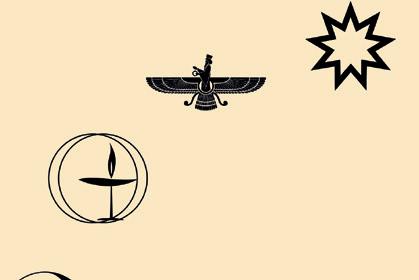 Lajna Imaillah
Lajna Imaillah
Prairie Region, Canada
Saeeda Khanem
Regional Tabligh Co-ordinator, Lajna Imaillah Prairie, Canada
Lajna Imaillah Prairie Region in Canada organised its first in-person interfaith symposia in the cities of Regina and Saskatoon under the theme “The Empowerment of Women Through My Faith.”
The first of the two interfaith symposia was held on 13 May 2023 at the Mehmood Mosque in Regina.
The event started with the recitation from the Holy Quran and its translation. An introduction to the centenary celebrations of Lajna Imaillah was presented to the guests by Faiqa Naz Sahiba. The first speaker, Karen Jelinski, represented the Lighthouse at the All Nations Church of Regina. She was followed by Gurdeep Kaur, who spoke on behalf of the Sikh faith. Judy Mazur represented Judaism, and Winna Martin, from Saint Paul’s Cathedral, represented the Christian faith. Elder Lorna spoke on behalf of the Indigenous Community.
Sadr Lajna Imaillah Regina, Madiha Musawar Sahiba represented Islam. Towards the end of the presentation, a few dignitaries also addressed the attendees and gave their viewpoints. The event concluded with a silent prayer.
Lajna Imaillah Regina also received written greeting messages and acknowledgement of the contribution of Lajna Imaillah Regina from the Lieutenant Governor of Saskatchewan on behalf of His Majesty King Charles III, the Prime Minister of Canada Justin Trudeau, and the Mayor of Regina. An in-person greeting was also received from Laura Ross on behalf of the Saskatchewan Premier, MLA Nicole Sarauer on behalf of NDP Leader Carla Beck, Regina School Board Trustees, and Nancy MacKenzie, Executive Director, Customer Experience, Regina Public Library.
Guests attending the symposium also included members from Luther College, the Church of Jesus Christ of Latter Day Saints, Mary of Magdala inclusive Catholic, the Holy Child Roman Catholic Church, Living Hope Alliance Church, the Multicultural Council of Saskatchewan, the Regina Multi-faith Forum, and the Regina Immigrant Women’s Centre.
The symposium was attended by 68 guests, who were shown around the mosque and visited various stalls.
The second symposium was held at the Bait-ur-Rahmat Mosque in Saskatoon on 29 May 2023. The purpose of the event was to introduce the beautiful and
Jamaat Ahmadiyya Canada hosts first Religious Refugees Conference
Syed Mukarram Nazeer
Canada Correspondent
peaceful teachings of Islam to different schools of thought.
The event started with the recitation from the Holy Quran, followed by its translation. Nuur Anwar Sahiba welcomed the guests and presented the history of Lajna Imaillah. The subsequent event consisted of five speeches by different faith speakers, including Pastor Fran of the Christian faith, Malvina Repko of
Refugee Sponsorship and Settlement Desk (RSSD) Canada, in collaboration with Religious Refugee Services (RRS) Canada, hosted a conference on 27 and 28 May 2023, reported the Chairman of RSSD Canada Abdul Haleem Tayyab Sahib.
RRS is a non-profit charitable organisation dedicated to supporting refugees, advocating for religious refugees, and helping with resettlement in Canada. It provides individual and group services to those navigating a new life in Canada.
The conference was hosted to create awareness and empathy for religious refugees, so other countries can come forward and explore how to serve these refugees in their resettlement.
The first day of the conference began with the recitation from the Holy Quran with its translation, followed by welcome remarks by Amir Jamaat-e-Ahmadiyya Canada Lal Khan Malik Sahib.
35 representatives from six countries attended the first day of the conference in person, with a total of 66 participants who joined online throughout the day.
invited as guest speakers and gave an account of the pain and suffering of refugees and life after resettlement in Canada.
Secretary of the International Human Rights Committee (IHRC) UK, Naseem Malik Sahib, also spoke at the event.
Some guest speakers were asked to share how the love of Khilafat motivated them to sponsor refugee families without any personal relationship or gain.
Naib Amir Jamaat-e-Ahmadiyya Canada led a discussion with representatives of various countries around the world, who provided their own perspectives on refugee programmes specific to their country and the workings of sponsorship and settlement programmes. The UK was represented by Qaseem Hayat Sahib, while Dr Dawood Majoka Sahib represented Germany.
The first day concluded with delegates offering congregational Zuhr prayer, followed by lunch.
The second and final day of the conference was presided over by Amir Sahib Jamaat-e-Ahmadiyya Canada. The session began with a recitation from the Holy Quran and its translation. Naib Amir Sahib provided an introduction to the programme of the day.
Judaism, Dr Harjeet Kaur belonging to the Sikh faith, Dr Vasundha Eraguntala of the Hindu faith, and lastly, Dr Sadaf Baloch Sahiba, who presented the view of Islam Ahmadiyyat.
Councillor Bev Dubois also spoke to the attendees and gave a short address thanking everyone for the event. The presentation ended with the Regional Sadr Lajna Imaillah, Bushra Nazeer Aftab Sahiba, speaking about the achievements of Lajna Imaillah. She thanked all the speakers and guests and appreciated the tireless efforts of the volunteers to make this event successful.
Overall, the event was attended by 72 guests, which included the Board of Trustees, doctors, scientists, educators, lawyers, engineers, and politicians. Nearly 80 Lajna members attended the event. The event concluded with a silent prayer.
After the event, the guests visited various exhibitions and expressed their gratitude for the warm hospitality exhibited by Lajna Imaillah. The evening concluded with Lajna members and guests having dinner together.
The Premier of Saskatchewan, Scott Moe, sent a written message congratulating Lajna Imaillah on its centenary. Similar messages were also received from other government officials.
In Saskatoon and Regina altogether, 140 non-Ahmadi guests, 120 Lajna members, and 10 nasirat attended the two interfaith symposia.
Naib Amir Jamaat-e-Ahmadiyya Canada, Farhan Khokhar Sahib, gave an overview of the day and moderated the conference. Chairperson RSSD Canada gave an overview and achievements of the refugee sponsorship and settlement process.
This was followed by a presentation by Secretary Umur-e-Kharija, Amjad Khan Sahib. President of the Ahmadiyya Muslim Lawyers’ Association Canada, Maood Bin Tahir Sahib, shared a case study to show– how various volunteers of RSSD come together to facilitate the immigration process.
Director and Secretary of the Board of Directors of RRS, Rahman Masood Mohar Sahib, gave a presentation on the financial impact of sponsorship programmes by Canada Jamaat.
Some refugee family members were
Message of Islam Ahmadiyyat conveyed to bishops in Malaysia
Abdul Aziz Bin Mohd Ibrahim Secretary Tabligh, Penang, Malaysia
A delegation of Jamaat-e-Ahmadiyya Penang, Malaysia, met with the bishops from Penang churches and presented them with Jamaat literature, including the book World Crisis and the Pathway to Peace, and a leaflet about the Promised Messiahas
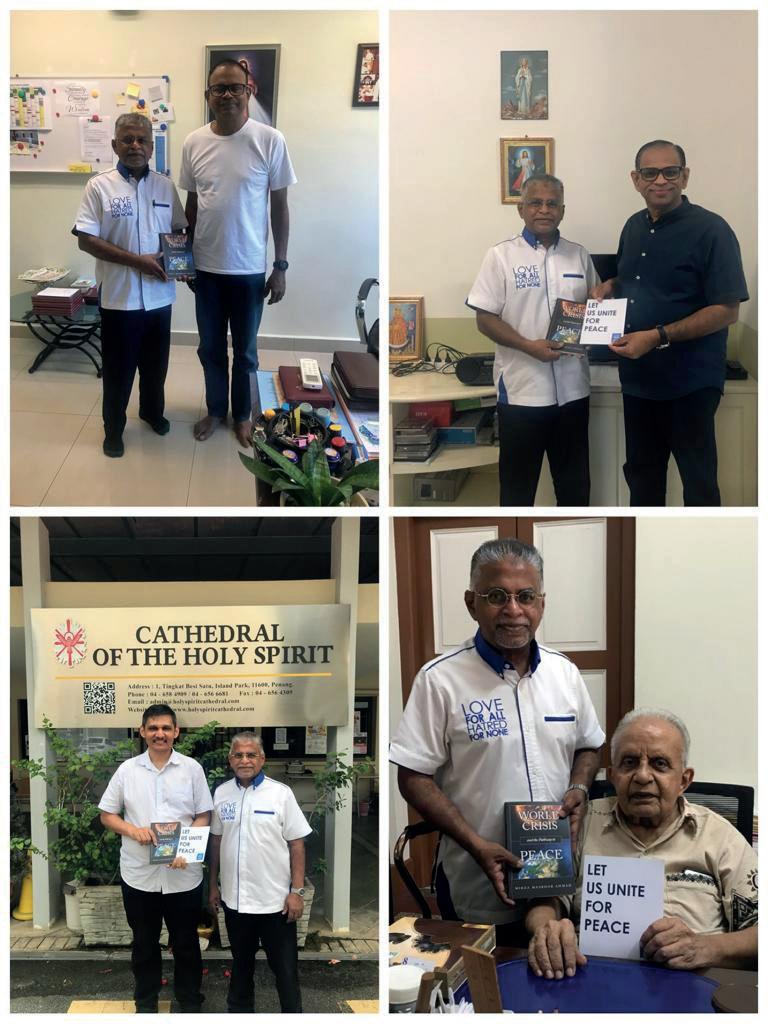
33 representatives from eight countries attended the event in person, with a total of 61 participants who joined online throughout the day.
The head of the IHRC, Dr Sir Iftikhar Ayyaz Sahib, shed light on the refugee situation in developing countries.
The chairperson of RSSD moderated the session with the help of President AMLA and spoke on legal challenges and support for refugees as immigrants when they arrive in Canada.
Naib Amir Sahib led an open forum panel discussion on worldwide issues facing Ahmadis in various countries.
Members of the panel elaborated on the future plans and challenges.
Finally, Amir Sahib Jamaat-eAhmadiyya Canada concluded the session with closing remarks and a silent prayer.
11 AL HAKAM | Friday 23 June 2023
Photo courtesy AMJ Malaysia
GDJ | Pixabay
Hazrat Musleh-e-Maud’s lectures in Lahore and Amritsar, 1920
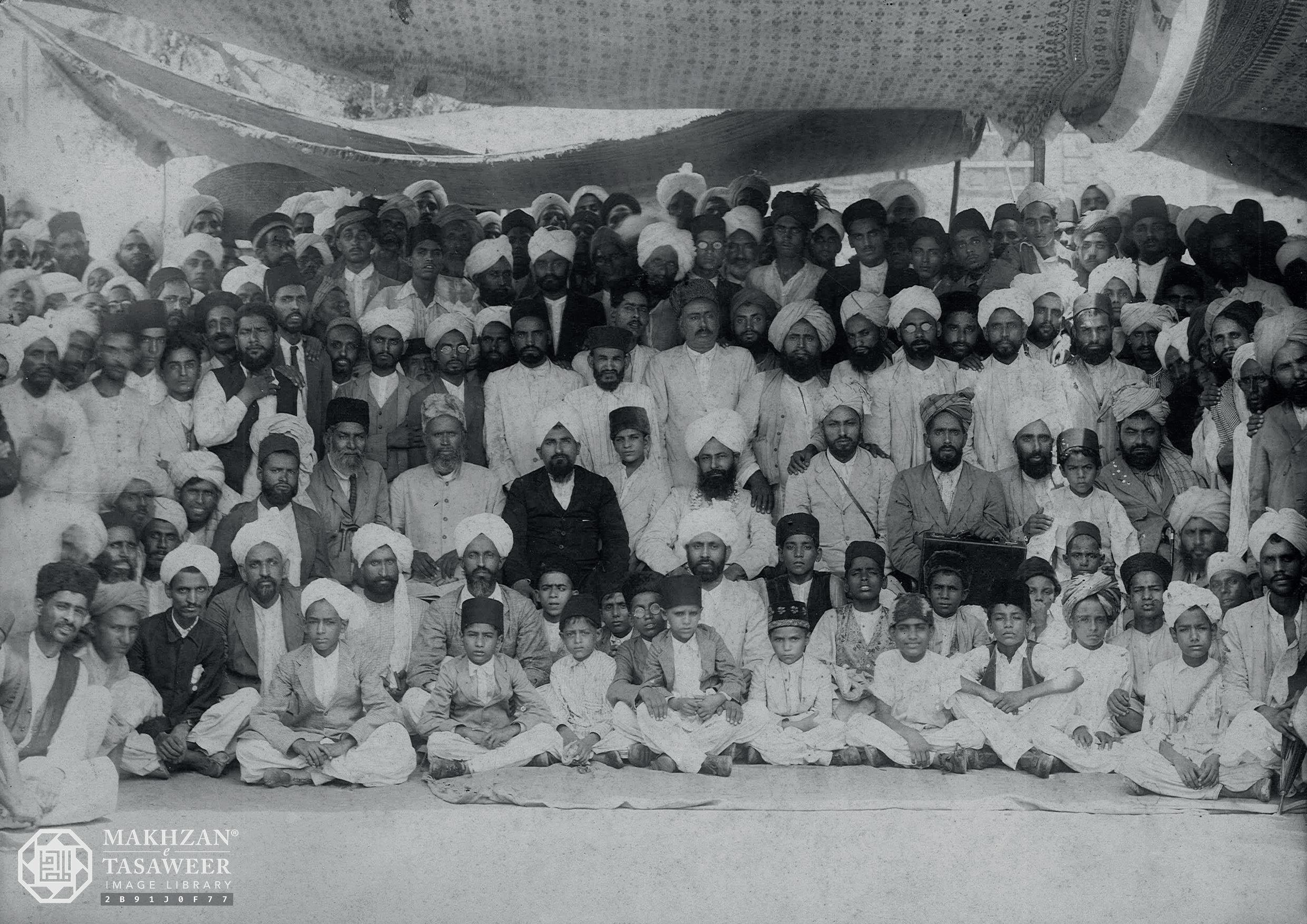
Response to an appeal of British Prime Minister, David Lloyd George
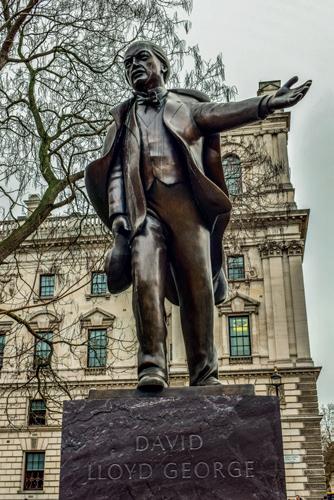

British Prime Minister’s appeal
In his New Year’s Message for the year 1920, along with the other Premiers of the Empire, the then British Prime Minister, David Llyod George, appealed to the people of the British Commonwealth to pay heed to the teachings of Christianity and suggested that this was the only means for the foundation of world peace.
The People of London wrote:
“New Year’s Message From Premiers.
“‘Brotherhood of Humanity.’
“The following New Year’s message, which has been signed by Mr Llyod George, Sir Rbt. Borden, Mr WM Hughes, Gen. Louis Botha (who has since died), Mr WJ Massey, and Mr RA Squires, as Prime Ministers of the British Empire, was published yesterday throughout the world. It has been entrusted to the National Laymen’s Missionary Movement of Great Britain and Ireland:
“‘Material Force Useless.
“‘To our fellow citizens of the British Empire—The war, in shaking the very foundations of ordered civilization, has driven all thoughtful men to examine the bases of national and international life. It has become clear today, both through the arbitrament of war and through the tests of rebuilding a life of peace, that neither education, science, diplomacy, nor commercial prosperity, when allied with a belief in material force as the ultimate power, are real foundations for the ordered development of the world’s life. These things are in themselves simply the tools of the spirit that handles them. Even the hope that lies before the world of a life of peace protected and developed by a League of Nations is itself dependent on something deeper and more fundamental still. The cooperation that the League of Nations explicitly exists to foster will become operative in so far as the consenting peoples have the spirit of goodwill. And the spirit of goodwill among men rests on spiritual forces; the hope of a “brotherhood of humanity” reposes on the deeper spiritual fact of the “Fatherhood of God”.
“‘The Ultimate Foundation
“‘In recognition of the fact of that Fatherhood and of the Divine purpose for the world, which are central to the message of Christianity, we shall discover the ultimate foundation for the reconstruction of an ordered and harmonious life for all men. That recognition cannot be imposed by Government. It can only come as an act of free consent on the part of individual men everywhere. Responsible as we are in our separate spheres for a share in the guidance of the British Empire as in places it faces the problems of the future, we believe that in the acceptance of those spiritual principles lies the sure basis of world peace. We would therefore commend to our fellow-citizens the necessity that men of goodwill who are everywhere reviewing their personal responsibilities in relation to the reconstruction of civilisation should consider also the eternal validity and truth of those spiritual forces which are in fact the one hope for a permanent foundation for world peace.’” (The People, 4 January 1920, p. 16)
The Marlborough Express of New
Zealand and The Evening Telegraph of Dundee also published this message in their 5 January 1920 issues.
The Aberdeen Daily Journal wrote that Bishop Deane of St. James’s Episcopal Church in Aberdeen stated that “never in all history had there been an appeal put forward by the hands of Governments so entirely religious as that one was-and every word of it was true.” (The Aberdeen Daily Journal, 5 January 1920, p. 8)
Bishop Deane further said that “In the newspaper, the appeal had been headed ‘Back to God,’ but he would have liked to have seen it ‘Back to Christ.’” (Ibid.)
The Civil and Military Gazette reported about this message in its 4 January 1920 issue, and on 7 January, republished it with some corrections as conveyed by Reuters:
“A telegraphic correction received from Reuters states that the New Year’s message from the Premiers of the British Commonwealth, dated December 29, should read as follows:
“‘A New Year’s message from the Premiers of the British Commonwealth of Nations is issued over the signatures of Mr Llyod George, Sir Robert Borden, Mr Hughes, General Smuts, Mr Massey and Mr Squires of Newfoundland. The message, which is addressed to ‘Fellow citizens of the British Empire,’ emphasises that in recognition of the Fatherhood of God and the Divine purpose for the world, which is centred in the message of Christianity, will be discovered the ultimate foundation for the reconstruction of an ordered, harmonious life for all men. As that recognition can only come as an act of free consent on the part of individual men everywhere, the message appeals to men of good will to consider the eternal validity and truth of those spiritual forces, which are the one hope for the permanent foundation of world peace.” (The Civil and Military Gazette, 7 January 1920, p. 3)
Friday 23 June 2023 | AL HAKAM 12
Ata-ul-Haye Nasir
Al Hakam
David Lloyd Geaorge, 1917 | The Prime Minister: A Life and Times of David Lloyd George
dimitrisvetsikas1969| Pixabay
Members of the Jamaat with Hazrat Musleh-e-Maudra, Amritsar
The Australian Christian Commonwealth, the organ of the Methodist Church in South Australia, stated:
“It was an excellent bit of reading that came to us from England by Tuesday morning’s papers, which we reprint, and we thank God for it and take courage:
“‘The Archbishop of Canterbury (Dr Davidson), the Archbishop of York (Dr. [Cosmo Gordon] Lang), and the Free Church leaders (Revs. F.B. Meyer, Dr John Scott Lidgett, John Howard Shakespeare, and Dr A. Guttery) as leaders of churches, have issued a new year’s message, based on the appeal of Mr Lloyd George and the Prime Ministers of the self-governing dominions, that the efforts for bettering the world should not be based merely on material things. The message says the Prime Minister’s appeal is the utterance of a statesman who has had experience in the arbitrament of war and adds: ‘We should seek the kingdom of God and his righteousness. We should test all our actions, social, industrial, and international, by the standard of His teaching. We put before professing Christians this three-fold call, firstly to rededicate ourselves to Christ’s active service; secondly, in combating the impulse for mere selfish gain to test our actions by Christlike standards; thirdly, to unite in prayer, in counsel, and in action, so that our common Christian citizenship may become the foremost power in the national life.’’” (The Australian Christian Commonwealth, 16 January 1920, p. 9)

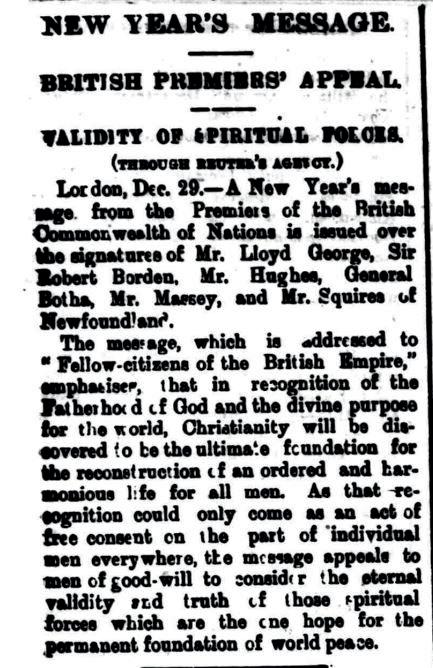

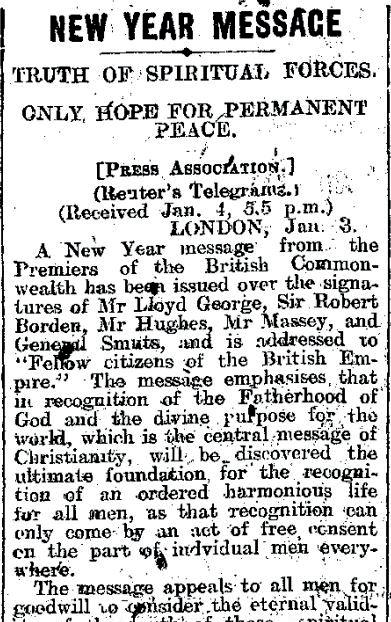
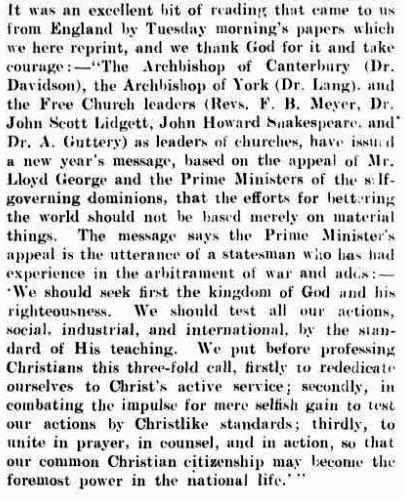
Hazrat Musleh-e-Maud’sra response
In response to the messages from the British Prime Minister and the Christian clergy, Hazrat Musleh-e-Maudra delivered two lectures, the first in Lahore and the
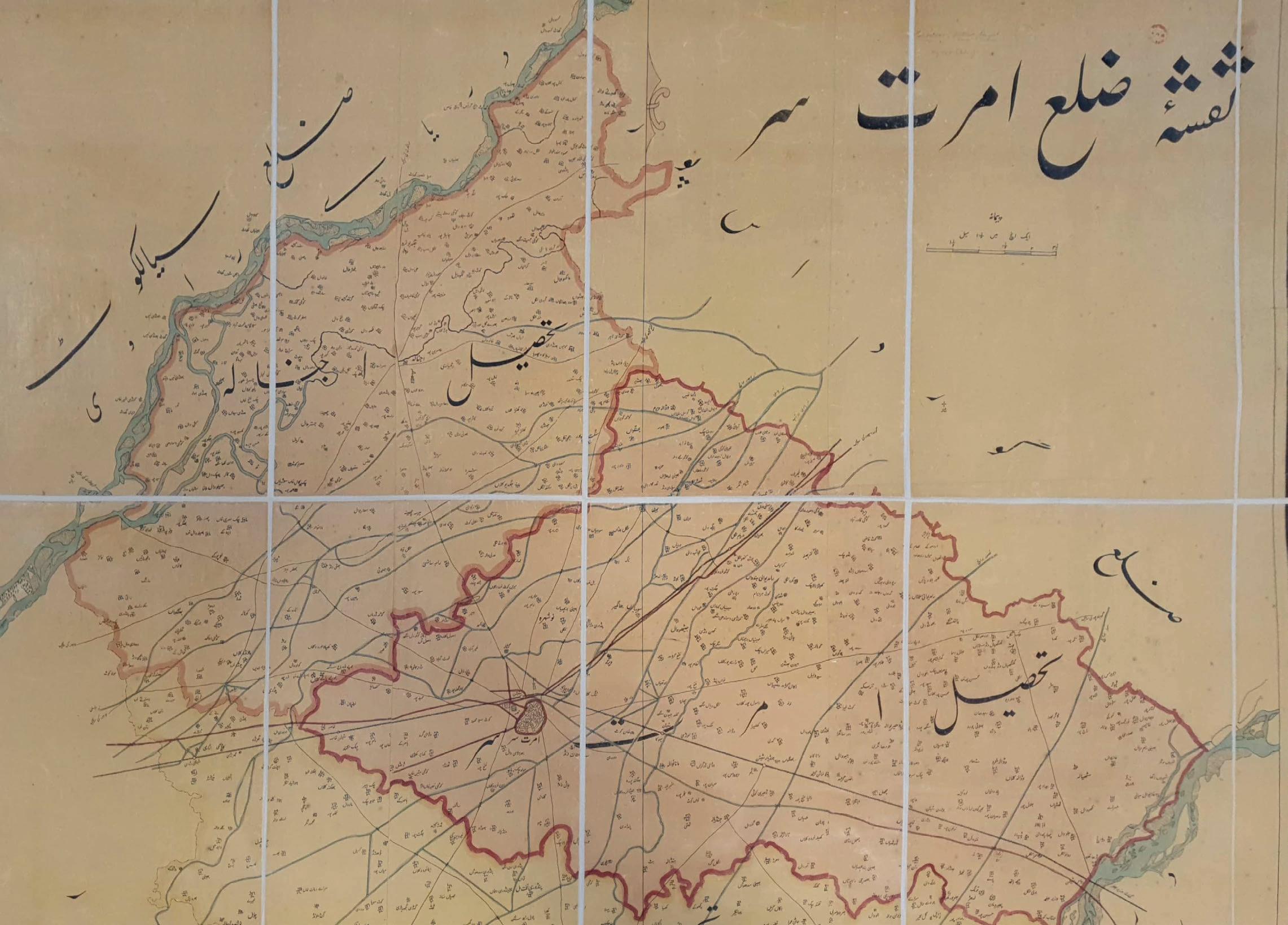
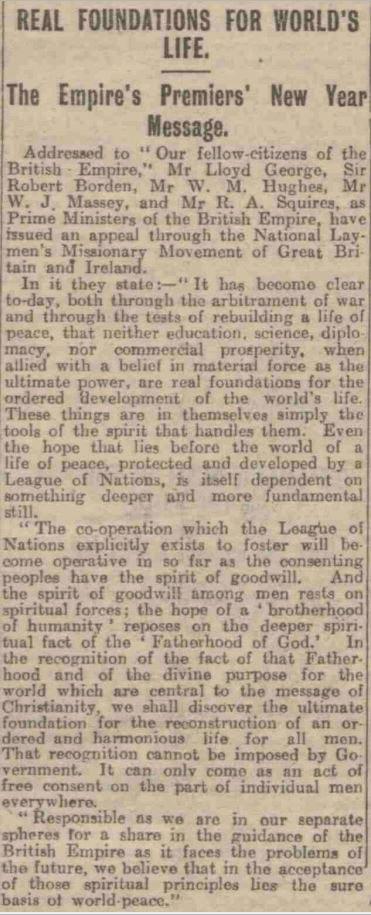
second in Amritsar.
Lecture in Lahore
On 15 February 1920, Hazrat Muslehe-Maud, Mirza Bashir-ud-Din Mahmud Ahmadra delivered a lecture at the Bradlaugh Hall in Lahore, titled “Kiaa dunya ke amn-o-amaan ki buniyad Isa’iyyat par rakhi ja sakti hay?” – Could the foundation of world peace be laid on Christianity?
The session was presided over by Khan Zulfiqar Ali Khan, and the attendees included various non-Ahmadi Muslims, Hindus, and Sikhs as well.
At the beginning of his lecture, Huzoor ra mentioned the advent of the Holy Prophet Muhammadsa and said that the spirit
and passion which he had instilled in his Companionsra could be known through an incident when he asked them to conduct a census of the Muslims, and the number came to be 700. Upon this, a Companionra said to the Holy Prophetsa that since they were so many in number, they had no reason to fear being effaced from the face of the earth.
Huzoor ra said that it was indeed their faith that spoke, not their number. This passion was a reflection of the power of faith, sincerity, and certainty that was present in their hearts, and through these very traits, they gained great success in the world wherever they went. Nothing could hinder them since they possessed such great strength of faith and certainty.
Huzoor ra continued by saying that
today the number of Muslims who profess to follow the Holy Prophetsa is said to be 400 million, and is spread in all corners of the world. However, unfortunately, in contrast to the unshakable firmness of those 700 Companionsra, these 400 million Muslims are living in a sea of constant apprehension.
There is no doubt that everything around them seems to have joined together to destroy them. By now, only religious people were opposing them, however, recently, a voice has been raised by a person who is not religious, but a stalwart of the political world. He has claimed that Christianity will be discovered as the ultimate foundation for the reconstruction of an ordered and harmonious life for all people. In addition to this, he appealed to the people to accept Christianity.
Huzoor ra continued by saying that since these words have been uttered by a nonreligious person who does not know what the arguments are for the truthfulness of a religion, they do not hold any significance. However, if one looks at it as a call from the one who is responsible for peace, for being the Prime Minister of Britain, then its importance increases manifold and produces certain dangers as well.
Huzoor ra said that during his visit to Lahore, he deemed it essential to respond to this call on behalf of Islam. This announcement was not addressed to Muslims in particular; in fact, it was addressed to all citizens of the British Empire. However, it is the Muslims who are most vitally affected by the message, because these are the people who are closest to Europe and in immediate contact with Christianity. Hence, due to the fact that through this call, Muslims have been indirectly called out, I am here to respond on behalf of Islam.
13 AL HAKAM | Friday 23 June 2023
Continued on next page >> An old map
of Amritsar, by Slam Din, Mufid-e-Aam Press, Lahore, 1887
Left to right clockwise: The Evening Telegraph, 5 January 1920 | The Aberdeen Daily Journal, 5 January 1920 | The Civil and Military Gazette, 7 January 1920 | The Australian Christian Commonwealth, 16 January 1920
The Civil and Military Gazette, 4 January 1920
The Marlborough Express, 5 January 1920
Huzoor ra said that there are many who have become anxious after this announcement, considering it a disrespect to their religion, and asking as to what right a political leader holds to call people to his religion. However, they are wrong about this. In fact, I am pleased, since we have witnessed in the recent past that Europe is inclining towards materialism, and many high-profile personalities do not pay attention to religion. Now, when a political stalwart gives us a religious message, he will have to listen to our response as well. God has blessed us with this opportunity. Hence, when Islam has been addressed indirectly, a response from Islam will also have to be listened to, and we will respond to it from the depths of our hearts. He will have to listen to our response with calmness, just as we have received his message with calmness, and if he does not
do so, then his countrymen will laugh at him. Thus, this is an opportunity for us to present the teachings of Islam, from which we must benefit. There is no reason to show anger or feel disrespected.
After this, Huzoor ra narrated the translation of the Prime Minister’s message, which stated that the peace of the world has been tarnished and there is a need to establish it once again, which will be based on the teachings of Christianity. He suggests that peace can never be established without this.
Huzoor ra said that he wished to speak on this matter from two aspects. Firstly, whether Christianity can establish peace, and secondly, if it is unable to do so, then which religion would do it? Before proceeding further, I deem it essential to make it clear that the flaws in the followers of a certain religion cannot be used as an argument for proving the flaws of that religion itself. One ought to see what its teachings are. It can only be declared flawed if implementing its teachings causes a decline in one’s life; however, if one sees a decline due to abandoning its teachings, then the religion can never be blamed.
Huzoor ra continued by saying that Mr Llyod George has stated in his message that peace can be established if the world believes in God as the father. People may wonder how peace can be established through this principle, but the point is that when different people have a relationship with one common thing, a harmonious connection is fostered among those people as well. Thus, when all of the people believe in God as the spiritual ‘father’, it will be as if they deem each other as ‘brothers’, and in this scenario, there will be no dispute among those people. However, a point that arises here is that this principle can only be accepted if two points are solved. Firstly, is it only Christianity that presents the belief that God is the spiritual ‘father’, or do other religions also present it? Secondly, if any other religion does not profess this very belief but presents another belief that is better than that, why should one leave it and accept Christianity?
After this, Huzoor ra shed light on the fact that this belief is found in nearly all religions of the world, in some form or another, even in primitive nations. Moreover, Christianity itself has derived it from another nation. Huzoor ra then presented a comparison between the teachings of Islam and Christianity in light of the teachings presented in the Holy Quran and the Gospels. Huzoor ra proved the superiority of the Islamic teachings and stated that world peace could be established through the Islamic teachings alone, and that it could not happen through the teachings of Christianity.
Hazrat Musleh-e-Maud’sra speech lasted for two and a half hours, and the event concluded with a silent prayer led by Huzoor ra. (Al Fazl, 26 February 1920, pp. 3-4)
Lecture in Amritsar
On 14 April 1920, Hazrat Musleh-e-Maudra delivered another lecture on this issue, at the Vande Mataram Hall in Amritsar, titled “Kiaa dunya ke amn-o-amaan ki buniyad Isa’iyyat par rakhi ja sakti hay ya Islam par?” – Could the foundation
of world peace be laid on Christianity or Islam?” The session was presided over by Hazrat Sir Chaudhry Muhammad Zafrulla Khanra and the attendees included a huge number of Hindus and Muslims.
The Civil and Military Gazette reported:

“Mirza Bashir-ud-Din Mahmud Ahmad, of Qadian, delivered a lecture on April 14 in the Bande Mataram Hall on the subject: ‘Can the foundation of a world peace be based on Christianity or Islam.’ He tried in his lecture to show that Islam was the only religion on which world peace could be founded. Maulvi Ata Ullah, a Moslem preacher, made a counterdemonstration in the form of a religious sermon outside [...]. This is due to a longstanding antagonism between the oldschool Moslems and the followers of the Mirza.” (The Civil and Military Gazette, 18 April 1920, p. 5)
In the beginning, Huzoor ra mentioned the New Year’s Message by the British Prime Minister, Mr David Lloyd George.
After this, Huzoor ra said:
“I do not wish to comment on the intention and aim behind this announcement from Mr Llyod George, nor do I say whether or not it was made as a result of thorough contemplation and pondering. Moreover, I do not wish to say whether or not he kept in mind the fundamentals of Christianity while making this announcement. However, I say that the objective for which it has been announced, cannot be fulfilled in this way. Moreover, despite having certain characteristics, Christianity is neither able to lay the foundation of world peace, nor does it hold the strength to establish peace in the world. Today, I am here to narrate to you my views about this announcement, and to prove that Islam is the only religion upon which the foundation of world peace can be laid. If the world attempted to establish a ‘castle’ of peace on any different lines, it would be as if it were made on a sandbar, which could collapse at any time. Hence, if the world desires lasting peace, they are required to lay the foundation of the ‘castle’ of peace on Islam.” (Al Fazl, 19 April 1920, p. 2)
Further, Huzoor ra said that Mr Llyod George did not particularly address the Muslims, however, they are included amongst those who have been addressed by him:
“For this reason, I deem it essential to respond to it on behalf of Islam, and I wish to state the Islamic point of view in this regard.” (Ibid.)
After this, Huzoor ra expressed that he was pleased to see the politicians inclining towards religion:
“I wish to speak about this announcement from two aspects. Firstly, to speak about those attributes of Christianity that, according to Mr Llyod George, are a means to establish peace. Secondly, the methods that help foster peace have been taught by Islam. The first point Mr Lylod George has mentioned is that believing in God as the father is a belief that can establish peace, and second, that peace can be established if the world accepts those principles of virtue that have been taught by Christianity. I will address both points separately. If the point that peace can be established by believing in God as the father is correct, one needs to
ponder as to whether this belief is found in Christianity alone or in other religions as well. One finds that it is found in other religions as well [i.e. the belief in God as the spiritual father.]” (Ibid.)
As proof of this, Huzoor ra mentioned that this belief is found in various nations, from the least civilised to the most civilised ones. If such is the case, then what is the need for the followers of those religions to accept Christianity? (Ibid.)
When Huzoor ra mentioned a hadith of the Holy Prophetsa in which he said that God Almighty is far more merciful to His servants than a mother, the then imam of the local Khairuddin Mosque, Syed Ataullah Shah Bukhari – later to be known as the founding member of the Majlis-e-Ahrar – stood up and made hue, and demanded from Huzoor ra to state the exact reference of this hadith including the name of the book, page number, line number, and place of publication etc. He used vile language as well and attempted to instigate the members of the Jamaat there; however, Huzoor ra instructed the Ahmadis to stay calm, which they obeyed. When Ataullah Sahib continued this chaos, the police sent him outside along with his fellows. (Ibid.)
Once the situation was settled, Huzoor ra continued the lecture and narrated in detail the fact that Islam has given a teaching that is able to foster lasting peace and harmony in the world. Huzoor ra presented a comparison between the teachings of Islam and Christianity, in light of the Holy Quran and the Gospels, proved the superiority of Islam over all other religions, and made it clear that world peace can only be established through the teachings of Islam. (Ibid.)
As far as the act of Attaullah Sahib is concerned, he only wanted to interrupt the lecture by initiating a discussion on the authenticity of the hadith. Thus, for this reason alone, he created such a scene there.
In its 19 April 1920 issue, while narrating the incident that occurred during the lecture, Al Fazl published the full Arabic text of the above-mentioned hadith along with its translation and full reference. The hadith states:
“Some Sabis were brought before the Prophetsa and behold, a woman amongst them was milking her breasts to feed, and whenever she found a child amongst the captives, she took it over her chest and nursed it. The Prophetsa said to us, ‘Do you think that this lady can throw her son in fire?’ We replied, ‘No, if she has the power not to throw it [she would not].’ The Prophetsa then said, ‘Allah is more Merciful to His servants than this lady to her son.’”
(Sahih al-Bukhari, Kitab al-adab, Hadith 5999; Sahih Muslim, Kitab at-tawbah, Hadith 2754; and Mishkat al-Masabih, Kitab ad-da‘waat, Hadith 2370)
Friday 23 June 2023 | AL HAKAM 14
ىلص يبنلا ىلع م دق هنع هللا ىضر باطخلا نب رمع نع بلحت دق يبسلا نم ة أ رما ا ذ إف ، يبس ملس و هيلع هللا هت ذخ أ ىبسلا ىف ايبص ت دج و ا ذ إ ،ىقست اهي دث هللا ىلص يبنلا انل لاقف ، هتعض ر أ و اهنطبب هتقصل أف : انلق ۔ رانلا ىف اه دل و ةح راط ه ذه ن و رت أ : ملسو هيلع ه دابعب مح ر أ هللا : لاقف ۔ هح رطت ال ن أ ىلع ر دقت ىه وال اه دل وب ه ذه نم Hazrat Umar ra
al-Khattab
bin
narrated,
Continued from
The People, 4 January 1920
<<
previous page
Coming from every distant track
Professor Syed Akhtar Ahmad Orinvi meets with
Hazrat Musleh-e-Maudra
Al Hakam
Professor Syed Akhtar Ahmad Orinvi, a distinguished writer hailing from Patna, was born in August 1912 in Bihar, India. He received his primary education in Urdu, Persian, and English from his father, Hazrat Syed Wazarat Hussainra. Professor Orinvi completed his matriculation in 1926, and during his undergraduate studies in 1934, he was awarded a gold medal in the English examination. He ranked first in his MA Urdu programme in 1936.
Two years later, in 1938, he began serving as an Urdu lecturer at Patna College. His dedication to education and research earned him a D.Litt. degree from Patna University in 1965. He held the position of president of the Urdu department at Patna University from 1952 until his demise in 1975.
When Hazrat Musleh-e-Maudra initiated the Waqf-e-Zindagi scheme for the youth of the Jamaat, Professor Orinvi willingly presented himself for service. Being a lecturer at the time, he received guidance from Huzoorra to continue his current work with the profound words, “Allah has placed you at the gateway to hearts; persist in serving the faith.” Owing to his constant ill health, he was given this special permission to pursue his teaching career due to his special circumstances.
Throughout his life, Professor Orinvi demonstrated a fervent commitment to tabligh. He recalls that he did tabligh on different occasions to many dignitaries and political leaders like Mohandas Karamchand Gandhi, Jawaharlal Nehru, Rajagopalachari, Jayaprakash Narayan, Shri Krishna Sinha, etc. Despite battling chronic illness, he also maximised his contributions to Urdu literature. His prolific works spanned plays, novels, and numerous collections of fiction. Additionally, he regularly contributed editorials to national newspapers and produced several radio dramas and speeches that explored literary, social, and religious topics.
Upon being influenced by communism, Professor Orinvi visited Qadian and stayed there, seeking guidance from Hazrat Musleh-e-Maudra. He was profoundly impacted by Hazrat Musleh-e-Maud’sra charismatic personality, something he often referenced in his speeches and interviews.
(Daily Al-Fazl, 20 August 2005, pp. 4-5)
He had some confusion about the economic system of Islam during his studies. He consulted various scholars to resolve them, and they also exchanged ideas, but his mind remained unsatisfied. Finally, seeking a solution to his problems, he approached Hazrat Musleh-e-Maudra in October 1942. In a half-hour conversation, Huzoorra shed light on these problems in such an effective way that it satisfied
Professor Sahib.
The details of this important meeting are presented below, which were taken from Tarikh-e-Ahmadiyyat and mentioned by the professor himself.
Professor Sahib’s journey: Seeking guidance from Hazrat

 Khalifatul Masih IIra
Khalifatul Masih IIra
Professor Syed Akhtar Ahmad Sahib states that in October 1942, he left Patna for Qadian. He travelled through Delhi and arrived in Lahore. There, he stayed at a guest house. He stated that many important questions were creating anxiety in his mind. The complexes in his mind and the anxiety in his heart were related to economic problems. He added that he had studied the theories of socialism and capitalism concerning economic, industrial, and social organisation in the past years.
He continued to narrate that he stayed in the Lahore Ahmadiyya Hostel for a while, where he had the opportunity to meet some of the young members of the family of the Promised Messiahas He expressed his intention to them, and they all showed interest in this topic and supported his decision to travel to Qadian and seek guidance from Hazrat Khalifatul Masihra
Professor Sahib said that he shared his confusion with Hazrat Syed Mukhtar Ahmadra, Malik Ghulam Fareed Sahib, and Professor Muhammad Ali Ahmad Sahib. These esteemed elders insisted that he seek guidance from Hazrat Khalifatul Masihra. However, despite their encouragement, he said, he lacked the courage to face Hazrat Khalifatul Masihra and actively ask his questions. Professor Sahib requested Professor Muhammad Ali Ahmad Sahib to accompany him.
Proceeding to the meeting with Hazrat
Musleh-e-Maudra

Professor Syed Akhtar Ahmad Sahib states, one day, he received permission to meet with Huzoorra, accompanied by
Professor Muhammad Ali Ahmad Sahib. He said that during those days, Hazrat Abdul Rahim Dardra was likely performing the duties of the private secretary. When it was his turn to meet with Huzoorra, he said that he ascended the stairs leading to the top floor, where arches and doorways were adorned with carpets and chairs. Hazrat Khalifatul Masihra was seated, and as they climbed the final flight of stairs, they reached the top floor, where Huzoorra stood up to welcome them.

Professor Sahib said that the amount of grace and love was overwhelming. The way Huzoorra treated him with equality, brotherhood, and love in such a natural manner dissolved his hesitation, he said. And thus, he stated that he was able to present the concerns and dilemmas of his heart and mind openly before Huzoorra.
The momentous meeting with Hazrat Khalifatul Masih IIra
Professor Syed Akhtar Ahmad Sahib reminisced that he used to see Hazrat Khalifatul Masihra during the annual jalsas However, on such occasions, it would often rain. Huzoorra would sit on the floor and engage with the congregation.
He states that he had not previously had the opportunity for an individual meeting. He added that he had gathered the courage to discuss a very important topic with Huzoorra. During the mulaqat, Professor Sahib stated, Huzoorra created such a pleasant atmosphere that Professor Sahib’s courage increased, and his confidence was strengthened. This enabled him to speak openly with Huzoorra
After a brief introduction, he presented his confusion to Huzoorra and sought solace. The remarkable thing, Professor Sahib said, was that he didn’t even have to explain his difficulties in detail. Huzoorra understood everything with his extraordinary God-given insight and his mastery of external and internal sciences. Thus, Hazrat Musleh-e-Maudra began his answer. During this, not only were the veils of Professor Sahib’s mind lifted, but his heart also found immense satisfaction and peace. For half an hour, Huzoorra spoke with the utmost respect and love, while Professor Syed Akhtar Ahmad Sahib and Professor Muhammad Ali Ahmad Sahib sat and listened. Professor Sahib narrated that it felt as though Huzoorra was selecting the
15 AL HAKAM | Friday 23 June 2023
Awwab Saad Hayat
A series looking at the high standard of morals of the Promised Messiahas, his Khulafa and the hospitality of the Ahmadiyya Muslim Community when receiving visitors
Continued on page 19 >>
Paragons of chastity and what we can learn from them
Atif Rashid UK
Keeping chastity is not just a struggle in our time; prominent companions kept themselves pure despite trials and temptations around them.
The struggle to preserve and uphold chastity is not something new in our age. In every era, this has been a challenge for the religious. The Holy Quran mentions how, in the time of former prophets, both pious men and women kept themselves pure in the face of temptation.
Both Hazrat Yusufas and Hazrat Maryamas have been honoured as individuals who remained pure. Keeping chastity is a great virtue and a matter of honour in Islam. It teaches self-control and the regulation of natural impulses, while also providing various steps to help ensure this.
Today, negative temptations are one of the main obstacles for young men in achieving worldly and religious success because the concept of chastity has become meaningless and is entirely disregarded.
For many, the greatest stumbling block on the path to strong morals, let alone basic spirituality, tends to be a lack of control over their natural urges. In Western society, this struggle is amplified, as religious individuals are surrounded by the vast majority of people who do not think twice about engaging in relationships outside of marriage. They are bombarded with images on TV, on the streets, social media posts, and unrealistic depictions of love in movies, online videos, and pop culture. What respite is there for a believer except to live as a hermit? However, this option is neither feasible nor realistic.

Chastity used to be considered an honour even in Western countries – it used to be a girl’s name. There was a time when no one would vote for a leader of the country who was not married and did not adhere to traditional family values. Now, leaders are known to have multiple unmarried partners and engage in all sorts of vulgar talk. Some of the most prominent personalities in the world are caught up in scandals and activities that end up disgracing them. So, what hope is there for a believer?
Islamic Teachings on avoiding temptations
As with any vice, Islam believes in prevention over cure. That is why it takes steps to avoid any occasion that could lead to such a sin. The Holy Quran warns, “And come not near unto adultery; surely, it is a foul thing and an evil way.” (Surah Bani Isra’il, Ch.17: V.33). It does not just command not to commit adultery but also emphasises not going near
it, meaning to avoid everything that could potentially lead to it.
This is why the Holy Prophetsa urged young men to marry early, as it would help keep their gazes down and save them from illicit glances and desires. If one cannot afford to marry, he advised them to fast, as it would restrain their natural urges (Sahih al-Bukhari, Kitab al Nikah, Hadith 5066). The Promised Messiahas placed great emphasis on lowering one’s gaze. He made a point to say that Islam teaches not to look at women at all, whether with pure intent or ill, because this opens the door to illicit thoughts.
(The Philosophy of the Teachings of Islam, p. 47)
Hazrat Ahmadas, even in his youth, would be so careful not to take even one glance at a woman.
It is narrated that “upon entering his home, to refrain from looking outside whilst closing the door so that his vision would not meet with a woman’s. As soon as he entered, he would close the door with both hands behind his back and then would turn around to place the latch on the door.” (“The Promised Messiah’s residence in Sialkot: 1861 to 1868”, Al Hakam, 19 March 2021, Issue 157, p. 17)
While replicating such high standards of modesty may be very challenging, given the modern society we live in, that does not mean one cannot take appropriate precautions. Avoiding shaking hands with the opposite sex, refraining from speaking freely with female colleagues in relaxed and intimate environments, and marrying early are some remedies. However, the commandment of ghad-e-basar (lowering the gaze) is something to practise throughout one’s lifetime. Marriage alone cannot offer an unequivocally foolproof defence against the dangers of unfaithfulness and deception, as exemplified by numerous instances that occur in contemporary society.
This is why the lowering of the gaze is a permanent injunction to keep one’s thoughts pure. Thoughts arise from external stimuli, and the saying “out of sight, out of mind” is not just a well-known maxim but a reflection of reality. Once you see something, your
thoughts will be inclined towards it. Every action starts with a thought. Therefore, it is not acceptable to say, “There’s no harm in looking” or “There’s no harm in thinking it if you don’t act upon it.” True chastity involves avoiding any thoughts or feelings that even have the slightest potential to lead to committing an evil action. Hence, Allah says, “Whether you disclose what is in your minds or keep it hidden, Allah will call you to account for it.” (Surah al-Baqarah, Ch.2: V.285)
But sometimes, these unavoidable thoughts do arise. The Holy Prophetsa has given hope to believers, so they do not despair over things they cannot always control. He said, “Allah has forgiven my followers the evil thoughts that occur to their minds, as long as such thoughts are not put into action or uttered” (Sahih alBukhari, Kitab al-talaq, Hadith 5269).
However, it is not always possible to avoid first glances. This is why the Holy Prophetsa said:
“Do not follow one glance with another; you may be allowed the first [unintentional glance] but not the second.”
(Musnad Ahmad, Hadith 1369) When the companions asked him about accidental glances, he advised them to divert their eyes. (Sunan Abi Dawud, Kitab al-nikah, Hadith 2148) He also said: “When one of you sees a woman that he is fascinated with, then let him go to his wife, for indeed with her (his wife) is the same as that which is
with her.” (Jami‘ at-Tirmidhi, Kitab al-riza’, Hadith 1158)
Getting married and keeping one’s gaze low protects one from glances that lead to ill thoughts. At the same time, it is important to avoid any instances of being alone with a woman, whether at the workplace or elsewhere.
“Whenever a man is alone with a woman, Satan makes a third,” warned the Holy Prophetsa. (Mishkat al-Masabih, Kitab al-nikah, Hadith 3118) He was, of course, referring to the inevitable thoughts and feelings that will arise in such a situation. He further instructed, “No person [man] should be alone with a woman except when there is a mahram with her.” (Sahih Muslim, Kitab al-hajj, Hadith 1341c)
This not only protects one from illicit thoughts and feelings and eliminates the risk of any inappropriate actions, but it also safeguards another from any misinterpretation on the part of the other person. Even if one’s intentions are pure, the other person may misinterpret or make false allegations, leading to significant distress and uncertainty later on. Ultimately, it becomes a situation of their word against one’s, without any third-party involvement.
Pious examples of modesty
The companions of the Promised Messiah, peace be upon him, exemplified a path of chastity and modesty in an era beset with its own challenges. Their steadfastness
Friday 23 June 2023 | AL HAKAM 16
Michael Daniels | Unsplash
acts as a moral compass in our modern, permissive society. I will delve into specific instances from their lives to provide further inspiration and guidance:
In his youth, while on a tabligh trip as an unmarried man, a woman approached Hazrat Ghulam Rasool Rajekira, a prominent companion of the Promised Messiahas, expressing her desire to marry him. He firmly informed her that arranging a marriage in such a manner was against Islamic law. He then returned to Qadian.

Upon arriving in Qadian, he had a dream in which he saw the Promised Messiahas who asked him, “Who is that person in your heart besides God?” In the dream, he also saw the girl appearing extremely ugly, which ignited intense hatred and revulsion within him. He narrates that his heart was cleansed of all other loves, and he remained devoted solely to the love of God. (Hayat-e-Qudsi, pp, 75-76)
From this, we learn that, if one wishes to overcome a bad thought or inappropriate feelings for someone of the opposite sex, one method is to consciously think negatively of them and imagine them as unattractive and undesirable. Focus on their negative features and bring them to the forefront of your mind. Additionally, it is crucial to avoid situations that may trigger such inappropriate thoughts in the first place.
Hazrat Munshi Ismail Sialkotira once encountered a beautiful lady adorned in beautiful attire approaching him. Satan whispered in his mind, urging him to take a look just to find out who she was. However, Munshi Ismail firmly responded, “No, why should I look at her?” Satan then argued, “It’s not forbidden to admire God’s beautiful creation; it is only forbidden to look with ill intent.” It is worth noting how Satan attempted to incite him using religious arguments, knowing his religious disposition. Nonetheless, the companion remained steadfast and resolute, refusing
to look. The lady passed by without him casting a glance.
On her way back, Satan made another attempt to entice him by saying, “Just take a look; at least find out whose sister or daughter she is and which house she has come from.” However, the companion remained resolute, questioning the need to look. At that moment, he noticed a tall man standing before him, weeping profusely. Curious, Munshi Ismail asked the man about his identity and the reason for his tears. The man revealed, “I am Satan, and I am crying because if every person in the world was like you, where would we get our sustenance from? Who would listen to us?” (Ashaab-e- Ahmad, Vol.1, pp.195-196)
Evidently, this vision was experienced by a companion who possessed a profound understanding of the Quranic injunction to “lower the gaze.” It serves as a powerful reminder of the importance of steadfastness in avoiding sin and acquiring knowledge from the Holy Quran.
Even companions who held high worldly offices like Hazrat Ch Zafrulla Khanra displayed exemplary morals in this regard:
“Once, while on a ship going back to India just before the First World War, an elderly European man said to him: ‘You are a handsome man, yet you do not drink, do not smoke and do not laugh.’ In reply, Hazrat Ch Zafrulla Khanra said, ‘Sir, I admit I do not drink, I do not smoke, but I laugh all the time.’ A lady nearby who heard the conversation said that what the gentleman meant was that you do not ‘love’ meaning you do not flirt. He asked her how that man happened to know this as a fact. She said, ‘I am a woman who can tell, and I say that you do not flirt.’” (My Mentor, Anwar Kahlon, p.
4)
Maulana Jalaluddin Shamsra and Hazrat
Maulana Abul Ata Jalandhri, two of the most renowned Ahmadi preachers in Jamaat history, walking in the markets and through the streets, and even sitting in shops, yet their gaze never wandered here and there,” he recounted. “Our Jamaat is destined to propagate purity. The position of our preachers is not limited to their personal adherence to purity; they have also become a magnificent lighthouse guiding others.” (Hayat-e-Khalid, pp. 318-19)
The Holy Prophetsa narrated a parable about three men who found themselves trapped in a cave. The first two prayed to God, recounting a good deed they had done, and with each prayer, the rock blocking the cave’s entrance moved slightly. The third humbly appealed to Allah, acknowledging his intention to commit a sinful act with his cousin but refraining from it due to fear of Allah’s commandments. He described how he had gathered a hundred dinars to satisfy her demand, but when she reminded him of the importance of preserving chastity, he abandoned the act and left the money behind. With his sincere plea, the rock was miraculously removed by Allah, and they were saved, emerging from the cave unharmed. (Sahih al-Bukhari, Kitab ahadith al-Anbiya, Hadith 3465)
It often happens that when a pious individual exercises self-restraint for the sake of God, Allah eventually grants them their desire.
Once, a rich man’s beautiful daughter became lost on her way back from a picnic with her friends. In the midst of the dark and stormy night, she noticed a light emanating from a small mosque and approached its door. Inside, a young man who was staying there overnight greeted her and explained that he was unfamiliar with the area and unable to guide her home. However, he offered her shelter until morning, when the local residents would arrive for the Fajr prayer, assuring her that they would be able to assist her in finding her way back home. Grateful for the offer, she accepted and entered the mosque.
The following morning, upon her return home, the daughter recounted to her father an unsettling experience she had during the night. She revealed that she had witnessed the young man burning each of his fingers, one by one. Bewildered by her account, the father sought guidance from his spiritual mentor, who requested the presence of the young man to inquire about the events of that night. When questioned, the young man explained that while he was alone with the young woman, Satan had tempted him to approach her. However, mindful of the consequences in the Hereafter, he devised a test for himself. He decided to place his finger on the candle flame, and if he could endure the pain, he would proceed to approach the girl. Yet, the intensity of the burning sensation was too much to bear, causing him to withdraw his finger each time and refrain from approaching the girl. This self-imposed trial continued as he succumbed to temptation once again, willingly subjecting his second finger to the flame. In this manner, he persevered, enduring the burning of all his fingers while steadfastly preserving both his own and the girl’s chastity.
The spiritual guide advised the rich man to marry his daughter to the young man. However, the rich man expressed his reservations, citing the stark contrast in their upbringings. His daughter had been raised in affluent circumstances, whereas the young man was a poor orphan. In response, the holy man conveyed that material wealth could be bestowed upon the young man through the rich man’s resources, but true piety and righteousness were not easily found in a wealthy man. Convinced by this wisdom, the rich man agreed and proceeded to arrange the marriage between his daughter and the young man. (Hayat-eNoor, pp. 67-69)
That holy and wise man was none other than Hazrat Hakeem Maulvi Noor-udDeenra, who later accepted the Promised Messiahas and also became Hazrat Khalifatul Masih Ira after his demise.
Majlis-e-Shura and Khilafat Day
jalsas held in Guinea-Bissau
over 3869 participants.
Early Ahmadi preachers also encountered these challenges when travelling from India to other parts of the world. Hazrat Yaqub Ali Irfanira wrote about the prevailing situation where European trends were influencing and introducing certain habits. He noted that smoking was becoming increasingly common and that the sense of chastity was diminishing upon witnessing immodesty in those countries. However, despite these temptations, Ahmadi preachers remained steadfast, resolute, and unwavering, just like a rock in the face of storms. “They did not alter their habits, change their attire, or cast their gaze upon indecent beauty. They maintained the highest level of purity and chastity,” he observed.
“Many times, I witnessed Hazrat
Jamaat-e-Ahmadiyya Guinea-Bissau organised jalsas to commemorate Khilafat Day throughout the country.
One jalsa was also held in the capital city of Bissau on 27 May 2023, and various events were arranged on different days in almost every jamaat across the country. Each event commenced with a recitation from the Holy Quran with its translation, followed by Arabic qaseeda and Urdu poems. Subsequently, speeches were delivered on topics such as “Blessings of Khilafat”, “Khalifa is Divinely Appointed”, and “Prophecies Concerning the Establishment of Khilafat”.
In total, 71 jamaats across the country organised Khilafat Day jalsas , benefitting
Majlis-e-Shura
Jamaat-e-Ahmadiyya Guinea-Bissau also held its 4th Majlis-e-Shura on 23 May 2023, with participation by elected representatives, missionaries, and teachers from various regions of the country.
The event commenced at 11am, presided over by missionary-incharge Muhammad Ahsan Memon Sahib. Following the recitation from the Holy Quran, Muhammad Ahsan Sahib delivered the opening address, emphasising the significance of the shura and the responsibilities entrusted to its representatives.
This was followed by the formal proceedings of the shura, and the event concluded with silent prayer.
17 AL HAKAM | Friday 23 June 2023
Zahid Ahmad Bhatti Missionary, Guinea-Bissau
Fuzail Ahmad | Pexels
Bridging the cosmos and faith: Islam’s perspective on role of science in understanding Divine
 Ehtesham-ul-Islam
Student Jamia Ahmadiyya UK
Ehtesham-ul-Islam
Student Jamia Ahmadiyya UK
On 30 May 2020, the world witnessed a remarkable feat of human ingenuity that captured the attention of newspapers across the globe. Against the backdrop of a relentless pandemic, a historic launch unfolded, signifying a turning point in the annals of space exploration. The stage was set at the Kennedy Space Centre in Florida, where the Crew Dragon, a spacecraft crafted by SpaceX, soared into space with two NASA astronauts on board, bound for the International Space Station. (blogs. nasa.gov/kennedy/2020/05/)
The triumphant success of the Crew Dragon marks the dawn of a new era, one that holds the promise of opening the vast frontiers of space to the wider world. With this technological marvel, SpaceX has propelled the future of human spaceflight towards a horizon filled with infinite possibilities. By introducing reusable launch systems that slash the average cost of space travel by a staggering five million dollars, the door has swung open to a realm once accessible only to a select few. As a result, more opportunities emerge for new equipment, eager manpower, and intrepid explorers to venture beyond our earthly confines, embarking on captivating journeys into space.
This, of course, is very beneficial for the sciences and the overall progress of humanity’s understanding of the universe. But you may be wondering: “Why am I reading this in an Al Hakam article? Why is this important to me as a Muslim?”
One of the fundamental principles
of Islam lies in the unwavering love and devotion to the Almighty God. Our purpose in this world is intricately intertwined with the worship of our Creator. While the act of offering the five daily prayers undoubtedly serves as a steadfast pathway towards fulfilling this objective, there also exists a remarkable opportunity to further elevate our worship by nurturing and fortifying our belief in the Divine.
By deepening our understanding of the Creator, we embark on a transformative journey, strengthening the sacred bond between ourselves and the One Who fashioned us into existence. Through this process, our worship becomes not only an obligation but a profound expression of love, reverence, and gratitude, propelling us towards a state of spiritual fulfilment and harmonious alignment with the divine purpose of our existence.
So, how can we attain this deeper understanding of our Creator and thereby elevate our worship?
Islam has always beckoned us to ponder over the breathtaking nature that surrounds us, where the signs of the Creator unfold in a symphony of flawless creation. And what can be a more compelling testament than the unfathomable expanse of the cosmos, a realm so vast that our minds strain to comprehend its entirety, a tapestry of stars that outnumber the grains of sand adorning Earth’s every beach, and a myriad of planets, each a masterpiece more captivating than the last?
“And We have, indeed, made mansions [of stars] in the heaven and have adorned it for beholders.” (Surah al Hijr, Ch.15: V.17)
While addressing the International Ahmadiyya Muslims Research Association
(AMRA) conference, Hazrat Khalifatul Masih Vaba, referencing the Promised Messiahas, stated that “studying physics, astronomy, and the sciences can lead a righteous person to Allah the Almighty. In doing so, one can appreciate Allah’s beauty as one learns and gains insight. True believers guide others with scientific knowledge and can prove God’s existence.”
( www.alhakam.org/a-challenge-forahmadi-researchers-hazrat-khalifatulmasih-addresses-members-of-amra/)
Therefore, it is imperative not only to seek spiritual insight but also to deepen one’s understanding of the sciences in order to reinforce one’s belief in the existence of God. It is a prevalent misconception among the faithless that religion and science are irreconcilable adversaries and that the advance of science will eventually disprove religion, but this notion couldn’t be more erroneous. Who can possess a more profound understanding of creation’s intricate mechanisms and sciences than the Creator Himself?
Promised Messiahas made a conclusive statement regarding this matter in his meeting with Professor Clement Wragge. He stated:“However far science might progress, it shall never be able to falsify the teachings and the principles of Islam.”
(“From the Archives: Professor Wragge’s Interview with the Promised Messiah (as)”, The Review of Religions)
By delving into scientific knowledge and findings, we uncover compelling evidence that bolsters our belief in the Divine and reveals the extraordinary harmony between religion and science. Whether it’s the creation of the universe or human embryonic development or among
numerous other examples, we witness the magnificent coherence between scientific discoveries and the teachings of our faith.
Hazrat Musleh-e-Maudra stated:
“The Promised Messiah showed convincingly that modern science and philosophy cannot overawe the Holy Quran. They cannot show any contradiction between the Holy Quran and reason. Science is concerned with nature, the handiwork of God. The Quran is the Word of God. Both His handiwork and His Word are His. There can be no contradiction between the two. If ever the Word of God seems to go against the facts of nature, it must be because it is not His true word, or if it is it cannot have been properly understood. The real Word of God cannot teach anything against the facts of nature.” (Invitation to Ahmadiyyat, p. 315)
In the journey of faith, science holds a pivotal role in its advancement. As scientific discoveries unfold, they shed light on the profound truths embedded within the Quran. In an era marked by the rise of atheism, the need to substantiate the existence of God becomes increasingly significant.
As Ahmadi Muslims, we should therefore ardently seek knowledge in the sciences, enabling us to provide compelling evidence of the Divine. May Allah bless us with prosperity in all avenues of beneficial knowledge, allowing us to fulfil our purpose to the fullest extent. Amin
“In the creation of the heavens and the earth and in the alternation of the night and the day there are indeed Signs for men of understanding;” (Surah Aal-e-Imran, Ch.3: V.191)
Friday 23 June 2023 | AL HAKAM 18
ActionVance | Unsplash
Khilafat Day event organised by MKA USA
Ibrahim Chaudhry
Mohtamim Tarbiyat, MKA USA
Majlis Khuddam-ul-Ahmadiyya USA held a Khilafat Day event on 27 May 2023, at the Baituz Zafar Mosque in Queens, New York and virtually broadcast it to all members across the country. More than 400 participants attended in person, with an estimated 3000 members joining virtually.
The event was presided over by Sahibzada Mirza Maghfoor Ahmad Sahib, Amir Jamaat-e-Ahmadiyya USA, and began with the recitation from the Holy Quran, followed by a hadith, Urdu poem, and opening remarks by Sadr Majlis Khuddam-ul-Ahmadiyya USA.
After the opening remarks, a presentation was conducted and moderated by my humble self. The presentation highlighted the need for Khilafat in our lives, and a few khuddam shared personal testimonies of how Khilafat had a revolutionary impact on their lives.
Afterwards, a quote of Hazrat Muslehe-Maud ra was presented regarding Khilafat.
The first speaker was a new convert from Philadelphia, Jaheim Thomas, who shared his conversion story and how his life completely changed after accepting Ahmadiyyat and coming under the blessed institution of Khilafat.
Then, a video clip of Hazrat Khalifatul Masih Vaa was played where he described
the divine institution and work of Khilafat compared to any other world leader and how Khilafat constantly cares for and prays for all the Ahmadis in the world. Another clip was played of Huzoor-eAnwar aa explaining how we can become the true sultan-e-naseer of Khilafat. This was followed by another quote of Hazrat Musleh-e-Maud ra
The next speaker was Naib Sadr MKA USA, Hibbi Iqbal Sahib, who shared his personal experiences and how khuddam can protect themselves from Dajjal by coming under the shield of Khilafat.
Another clip of Huzoor-e-Anwar aa was played about needing a leader.
Then, Seraj Bhatti Sahib shared his personal experiences with Khilafat and how he truly understood the divine status of Khilafat through the instructions of Huzoor aa on cryptocurrency and how he saw himself over the course of time, and how powerful Huzoor’s aa guidance was to protect Ahmadis from the repercussions of trading in crypto-currency while the whole world initially held the opposite opinion.
The last speaker, Zarik Khan Sahib, shared his experiences with Khilafat, who had the opportunity to do waqf-eardhi for a month in Islamabad, UK, and spend the blessed month of Ramadan in the company of Huzoor-e-Anwar aa
Towards the end, Amir Sahib Jamaat USA delivered an address highlighting the immense status of Khilafat and how to understand its true significance.
<< Continued from page 15
central and fundamental questions from his heart and mind and answering them in a profound and captivating manner.
Hazrat Musleh-e-Maudra, while discussing the two characteristics of communism, emphasised that communism aims to reform society through coercion. It employs coercion to seize the wealth of capitalists and redistribute it within society. Furthermore, coercion and violence plays a central and fundamental role in the establishment of the communist system.
Huzoorra emphasised that the use of force tends to evoke strong reactions, and its seemingly positive outcomes are shortlived. As an example, he pointed to the illfated attempt at enforcing an alcohol ban in America, highlighting its disgraceful failure. In contrast, he showcased the triumph of the Islamic prohibition of alcohol, preceded by a robust foundation of psychological revolution and moral reform. Islam recognised the importance of fortifying these fundamental aspects before addressing the issue of alcohol. It is worth noting, Huzoorra added, that Islam does not seek to seize wealth or control the means of production. Rather than advocating for the eradication of capitalism through coercion, Islam imparts teachings that facilitate a spiritual and moral transformation within society. Gradually, but assuredly, economic blessings are attained voluntarily, without forceful measures. Islamic education does not suppress individual creativity or competitive spirit. Instead, it nurtures voluntary benevolence, fostering an increased capacity for goodness, heightened social empathy, and a profound sense of compassion among individuals within the community.
Huzoorra further elucidated that communism, as a system, gradually suppresses the subconscious mental faculties. Firstly, communism places disproportionate emphasis on the value of




physical labour, failing to acknowledge the rightful place of mental work. Moreover, it employs coercion, mechanisation, and uniformity in a manner that damages the spirit of competition, stifles intellectual growth, hampers innovation and initiative, and diminishes the power of decisionmaking and will. As time passes, the negative effects of the communist system become apparent, turning momentary success into lasting inertia.
In contrast, Islam fosters equality, brotherhood, and freedom in society through a comprehensive approach encompassing the psychological, natural, moral, and spiritual realms. Islam employs independent and self-governing approaches to instil these values. Furthermore, it establishes economic equity through subtle yet highly effective wealth distribution, while simultaneously nurturing and cultivating intellectual capabilities.

Professor Sahib’s
to Hazrat Khalifatul Masih IIra

final question
Professor Syed Akhtar Ahmad Sahib said that he found immense satisfaction in Huzoor’sra interpretations. As Huzoorsa concluded his answer, Professor Sahib mustered the courage to pose one final question. He inquired about the possibility of establishing a cooperative agreement between a government representing the working class and the owners of the means of production, aiming to organise the economy without resorting to coercion. Such an arrangement would enable planned economic initiatives and ensure the country’s economic prowess remains intact. He wondered if such an approach would be deemed legitimate.
Hazrat Khalifatul Masihra replied that this approach shall indeed be deemed valid. With that, Professor Syed Akhtar Ahmad Sahib sought permission to take leave.
(Tarikh-e-Ahmadiyyat, Vol. 8, pp. 353358 was consulted in preparing this article.)

19 AL HAKAM | Friday 23 June 2023
Write to us on a range of topics! Info@alhakam.org Religion | Faith | History | Society
Jamaat-e-Ahmadiyya Liberia holds 15th Majlis-e-Shura
Farrukh Shabbir Lodhi Missionary, Liberia
The 15 th Majlis-e-Shura of Jamaat-eAhmadiyya Liberia was convened on 28 May 2023 at the Shah Taj Ahmadiyya High School in Monrovia. The arrival of delegates began a day prior and continued until the day of the shura . As the delegates arrived, they were issued cards and the registration procedure continued.
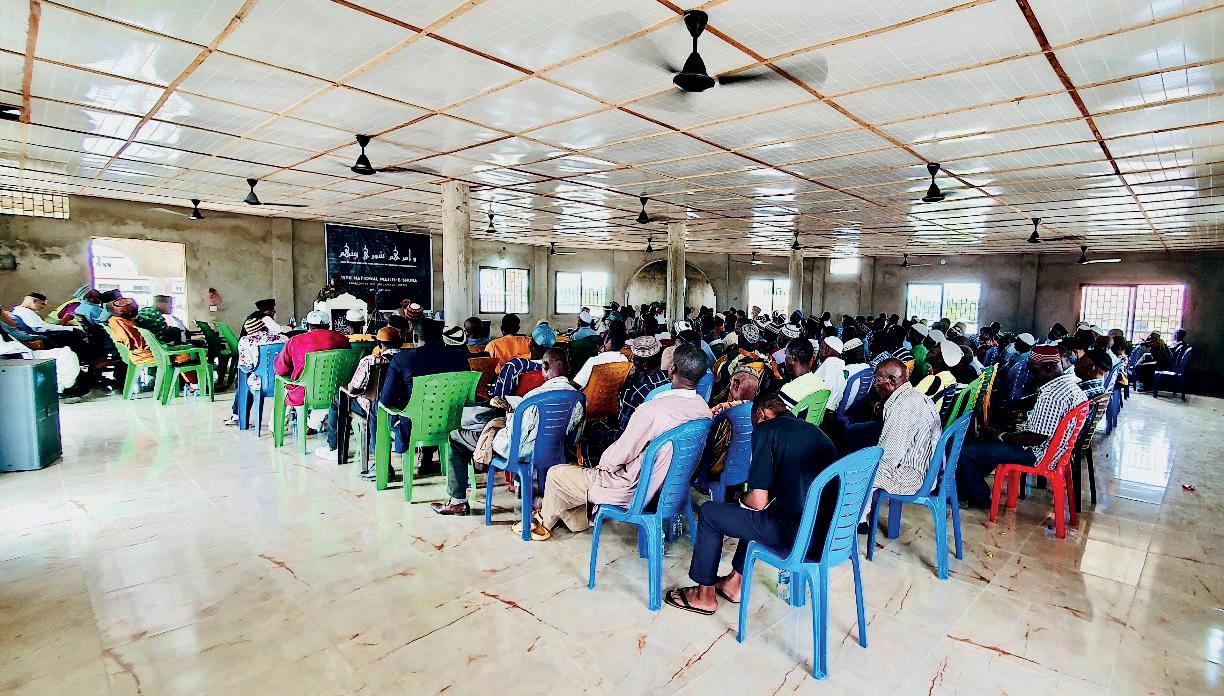
167 people attended the shura , including central and local missionaries as well as members of the national amila and representatives of the auxiliaries.
The event formally commenced with the recitation from the Holy Quran at noon and was presided over by the Amir and missionary-in-charge Liberia, Naveed Ahmed Adil Sahib. Amir Sahib addressed the audience and emphasised the importance and blessings of the shura system, as well as gave a detailed description of how it operates.
This was followed by the formation of the subcommittees to discuss the
proposals. There was a brief break for prayers and lunch following the establishment of the committees. Following that, all committees met at the designated locations. At 3pm, the second session commenced with the recitation of the Holy Quran. The chairmen of the subcommittees then delivered their recommendations to the house. The
Waqifaat-eNau Canada blessed to have virtual mulaqat with Huzoor
delegates present in the house were also given the opportunity to express their views, and all the recommendations were approved.
Finally, Amir Sahib called the attention of the delegates to their obligations and led everyone in silent prayer to conclude the event.
Järvaveckan: Tabligh stall held at major community event in Sweden
Kashif Virk Missionary, Sweden
Between 31 May and 2 June, the event “Järvaveckan” was held in Stockholm, which attracts representatives from all walks of life. The event is attended by various political leaders, NGOs, and cultural and religious organisations. The event was founded by the Global Village in 2016 and aims to engage people from socially segregated backgrounds to participate and be more involved in public and social life. The event attracts tens of thousands of visitors each year.
The theme of this year’s event was “Tomorrow’s Sweden”. It was about dreams and ambitions for how to build a stronger and fairer society.
Jamaat-e-Ahmadiyya Sweden arranged a stall for two days. During the other days, Jamaat was represented at the marquee of the Interreligious Council of Stockholm (IRiS).
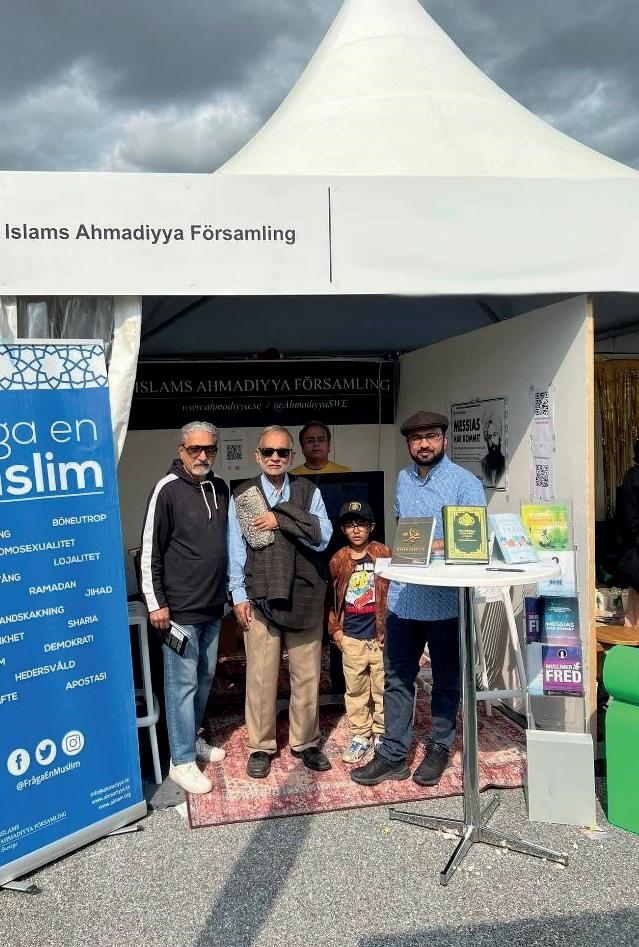
During these days, many visitors came to our stall and learned about Islam through our campaigns #FrågaEnMuslim (Ask A Muslim), #MessiasHarKommit
(The Messiah Has Come) and #KoranenLär (The Quran Teaches). A poll was arranged where public opinion was taken about the recent Quran burnings. The beautiful teachings of the Holy Quran regarding civil rights and responsibilities were displayed on a screen. Jamaat literature, including books such as World Crisis and the Pathway to Peace , Life of Muhammad sa, and Women’s Rights in Islam, was distributed to many visitors. During the event, copies of the Holy Quran were distributed to several notables who were in attendance. Among them were the former Prime Minister of Sweden, Stefan Löfven, the Bishop of Stockholm, and the chief of staff of the Swedish Army. Many Muslims who were unaware of the claims of Ahmadiyyat were introduced to its teachings.
Syed Mukarram Nazeer Canada Correspondent
Waqifaat-e-Nau from Canada were blessed to have a virtual mulaqat with Hazrat Khalifatul Masih Vaa on 11 June 2023, reported in-charge Waqifaat-e-Nau Lajna Imaillah Canada, Faiza Ahmed Sahiba.
Many waqifaat were meeting Huzoor aa for the first time. Registration was left open until the night before the mulaqat Even those who could not register due to some reason but showed up at the venue were accommodated. All waqifaat were comfortably seated in the hall at Aiwane-Tahir by 6am local time. They were provided with snacks. It was the first time that the Canadian waqifaat had a virtual audience with Huzoor aa
Upon the blessed arrival of Huzoor aa , everyone was in an unbelievable state of mind and felt that their dream had come true: Huzoor aa was right in front of them, interacting with them with kind prayers, being compassionate, caring, and guiding them with great wisdom. Huzoor’s aa kind and blessed conversation, his encouraging words for the presenters, and his very kind sense of humour made all members very comfortable very soon. It seemed that one hour passed in the blink of an eye. Huzoor aa left all with everlasting memories of guidance and prayers for Waqifaat-e-Nau Canada.
After the session, all attendees were served breakfast. All were encouraged to write letters of gratitude to Huzoor aa for granting so much time out of his extremely busy schedule.
Overall, the emotional experience was beyond any experience waqifaat had had before. Most stated that it was impossible to describe their sentiments in words. There were feelings of joy, overwhelming happiness, and tears that often accompany such precious moments with Huzoor aa. Others reported feeling as if they were at peace and that their faith was rejuvenated after seeing Huzoor aa
Friday 23 June 2023 | AL HAKAM 20
Photo courtesy AMJ Liberia
Photo courtesy AMJ Sweden
Friday Sermon
Mubarak Mosque, Islamabad, Tilford, UK
26 May 2023
Khilafat: The Divine bounty and blessings
After reciting the tashahhud, ta‘awwuz and Surah al-Fatihah, Hazrat Khalifatul Masih Vaa stated:
When Allah Almighty informed the Promised Messiahas that the time was nigh for him to depart this world, he addressed his Community saying:
“(Allah Almighty) manifests two kinds of power. First, He shows the hand of His power at the hands of His prophets themselves. Second, when, with the death of a prophet, difficulties and problems arise and the enemy feels stronger and thinks that things are in disarray and is convinced that now this Community will become extinct and even members of the Community, too, are in a quandary and their backs are broken, and some of the unfortunate ones choose paths that lead to apostasy, then it is that God, for the second time, shows His mighty power and supports and takes care of the shaken Community. Thus, one who remains steadfast till the end witnesses this miracle of God.
“This is what happened at the time of Hazrat Abu Bakr Siddiqra, when the demise of the Holy Prophetsa was considered untimely and many an ignorant Bedouin turned apostate. The Companionsra of the Holy Prophetsa, too, stricken with grief, became like those who lose their senses. Then Allah raised Abu Bakr Siddiqra and showed for the second time the manifestation of His Power and saved Islam, just when it was about to fall, and fulfilled the promise that was spelled out in the following verse:
“It means that, after the fear We shall firmly re-establish them. [Surah an-Nur, Ch.24: V.56]
“That is also what happened at the time of Mosesas, when he died on his way from Egypt to Kin‘an before taking the Israelites to the intended destination in accordance with the promise. At his [Moses’] death, the
Israelites were plunged into deep mourning. It is written in the Torah that with the grief at this untimely death and sudden departure of Mosesas, the Israelites wept for forty days.”
The Promised Messiahas then states:
“So, dear friends! Since it is the sunnatullah [the practice of Allah], from time immemorial, that God Almighty shows two manifestations so that the two false joys of the opponents be put to an end, it is not possible now that God should relinquish His sunnah [practice] of old. So do not grieve over what I have said to you, nor should your hearts be distressed. For it is essential for you to witness the second manifestation also, and its coming is better for you because it is everlasting, the continuity of which will not end till the Day of Judgement. And that second manifestation cannot come unless I depart. But when I depart, God will send that second manifestation for you, which shall always stay with you just as promised by God in Barahin-e-Ahmadiyya. And this promise is not for my person. Rather, the promise is with reference to you, as God [addressing me] says: ‘I shall make this Community who are your followers prevail over others till the Day of Judgement’. Thus it is inevitable that you see the day of my departure, so that after that day, the day comes which is the day of everlasting promise. Our God is He Who keeps His promise, is Faithful and is the Truthful God. He shall show you all that He has promised.
“Though these days are the last days of this world and there are many a disaster waiting to happen, yet it is necessary that this world continues to exist until all those things about which God has prophesied come to pass. I came from God as a manifestation of divine providence and I am a personification of His power. And after I am gone, there will be some other persons who will be the manifestation of the second
power [of God].”
He then states:
“God Almighty desires to draw all those who live in various habitations of the world, be it Europe or Asia, and who have virtuous nature, to the Unity of God and unite His servants under one faith. This indeed is the purpose of God for which I have been sent to the world. You, too, therefore should pursue this end, but with kindness, moral probity and fervent prayers.” (The Will [AlWasiyyat], pp. 5-8)
Thus, when the Promised Messiahas passed away, in accordance with His promise, Allah the Almighty gathered the Community at the hands of Hazrat Hakeem Maulana Noor-ud-Deen, Khalifatul Masih Ira. Despite the fact that some people wished for the Community’s administration to remain in the hands of the Anjuman, Hazrat Khalifatul Masih Ira crushed this disorder with an iron resolve.
After the demise of Hazrat Khalifatul Masih Ira, Allah the Almighty appointed Hazrat Mirza Bashir-ud-Deen Mahmood Ahmadra to the station of Khilafat [Caliphate]. Even when he became the Khalifa, some people who considered themselves to be more intellectual and wise began to spread disorder. They tried their utmost to stop the election of the Khalifa, if not for good, then at least for it to be delayed by a few months so that they could cause a rift within the Community. However, in accordance with His promise, Allah the Almighty gathered the Community of believers at the hands of a single person once again, and the opponents of Khilafat and the hypocrites failed in their attempts.
By the grace of Allah the Almighty, his Khilafat spanned almost 52 years. During his era, many missions were established and the foundations of the Community’s organisation were formed.
After his demise, the era of the Third Khalifa began and Hazrat Mirza Nasir Ahmad Khalifatul Masih IIIrh [the Third Caliph] was appointed to the station of Khilafat with the help and support of Allah the Almighty. In accordance with divine decree, when he passed away, Allah the Almighty appointed Hazrat Mirza Tahir Ahmadrh as the Fourth Successor to the Promised Messiahas
Upon his demise, Allah the Almighty appointed me to this station [of Khilafat]. And despite my weaknesses and shortcomings, Allah the Almighty, in accordance with His divine promises vouchsafed to the Promised Messiahas, has continued to grant success to the Community. During this time, the opponents have done their utmost in their efforts to cause division, finish the Community or instil fear. Ahmadis were martyred in different countries of the world and attempts were made to lure them away with worldly temptations; however, Allah the Almighty continued to strengthen the bond Ahmadis have with Khilafat along with their faith and conviction. Whether it is Ahmadis residing in Asia, Europe, America, or Africa, the relationship each and every one of them has with Khilafat can only be due to Allah the Almighty. No individual has the strength to create the kind of relationship of love and sincerity that the members of the Community have with Khilafat and that the Khalifa of the time has with the members of the Community. I witness this in every country I travel to. This is not just merely a verbal proclamation, in fact, now the cameras also capture these sights. MTA often shows these scenes as well and even the opponents of the Community are compelled to admit that the practical testimony of Allah the Almighty’s support is with Ahmadis. Moreover, there are thousands of letters that I receive every
21 AL HAKAM | Friday 23 June 2023
ب نم مهنلدبيلو مهل ىضترا ىذلا مهنيد مهل ننکميلو انمامهفوخ دع
month, which shows that those writing these letters have a great bond of sincerity and loyalty with the Community and that it is Allah the Almighty Himself Who attaches people to the institution of Khilafat and instils love and affinity in their hearts for Khilafat. At this time, I shall present a few letters as examples to illustrate how God Almighty guides people towards the truthfulness of the Promised Messiahas and how He instils in the hearts of the people that the institution of Khilafat, which was established after the Promised Messiahas carries the Divine support of God Almighty.

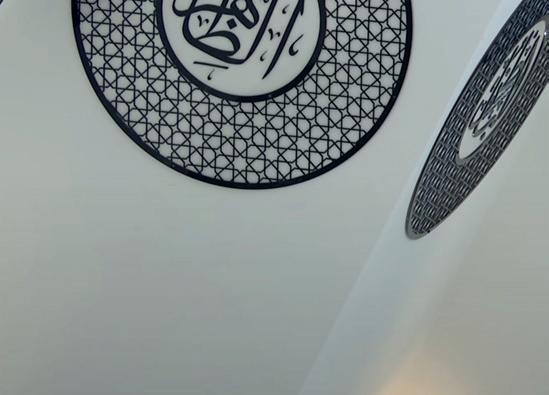

The mu‘allim from the Mwanza region in Tanzania wrote in his report, “One day, I went with the missionary after the Fajr prayer [prayer offered right before dawn] to meet the people. When we returned to the mosque before the Zuhr prayer [afternoon prayer], we saw a woman standing on the mosque stairs. After enquiring about her, we learned that she had come to request prayers. Perhaps she thought we also do the same as the non-Ahmadi Muslims with their customs, such as incantations and invocations etc. (These are very prevalent among [non-Ahmadi] people in Africa.) The missionary informed her of the Community’s teachings and prayed for her at the same time. The woman said, ‘I have been seeing dreams in which a man with a long beard and of a wheat-coloured complexion has explained religion to me in the same way that the missionary has just described it’. Then, she was introduced to the Community and shown pictures of the Promised Messiahas and his Khulafa Thereupon she said that the face of the person she was seeing in her dream was very similar to that of the Promised Messiahas or the Second Khalifa. This woman then pledged allegiance along with her three children.” Even in this era, the countenance of the Second Khalifa has been shown alongside the Promised Messiah’sas [in a dream].
Then there is a person named Abdullah who lives in an area in the West Kalimantan province of Indonesia, who pledged allegiance along with his wife and children. He had been in contact with the Community since 2019 and was influenced by what the missionary had taught him, which is why he would regularly visit the mosque, and also because he found him to be very different from the other clerics. In any case, due to his close relationship with the missionary, the clerics and locals of the area started making accusations against him, expelled him, and prohibited him from
entering their mosque. He said, “I saw in a dream that I was stuck in a whirlpool, and I was close to drowning. However, this pious man who was wearing a jubbah [long outer garment] and holding a cane came to save me.” Thereupon, our missionary showed him a picture of the Promised Messiahas holding a cane. Trembling, he said, “This is the same person who saved me with his cane from the whirlpool.” Similarly, his son also saw a dream – it was not only the father, but his son also saw a dream. He saw a number of people wearing a jubbah. Along with the picture of the Promised Messiahas, the missionary showed them pictures of the Khulafa, and in shock, the son said that among the people he saw were the Third Khalifa, Fourth Khalifa and myself. He said, “These are all the very people whom I saw.” Allah the Almighty showed them all at once to indicate that the Khilafat established after the Promised Messiahas was a continuing system. After seeing these dreams, this family pledged allegiance. If one has a true yearning, then these are also the ways in which Allah this Almighty grants His guidance.
In the southern province of Indonesia, there is a place called Barru. The Amir [National President] writes that their missionary was leading the Fajr prayer in the mosque, during which an individual joined the congregation. That individual said that he had travelled there to meet his wife’s relatives. During the conversation, he mentioned his past, which was fraught with difficulties. He stated that during his time of hardship, he met a saintly man with a white beard and turban in a dream. In the dream, the saintly man wearing a turban told him that if he gave alms at every Fajr prayer for 40 days, his hardships would be removed. He did as he was told in the dream. He reported that after just 20 days, his hardships began to dissipate. He also acquired various jobs and other amenities. He then reported that just three months prior, the saintly man donning a white turban and beard visited his dream once more and took him to a mountain to acquire fruit. He was told that he should only disclose this dream to those who exhibit righteousness. Following this, the missionary showed him pictures of the Khulafa. In astonishment, he pointed towards the picture of the Fourth Khalifarh, saying that he was the person he had seen. Thus, this person accepted Ahmadiyyat. Regarding a woman residing in Mali by the name of Saraji, the local missionary writes that she is exceedingly sincere. Whenever she hears of an event to

propagate Islam in nearby villages, she asks her children to take her there on a bicycle. She says that before becoming an Ahmadi, she used to hear two voices in her dreams; one voice was my recitation of the tashahud and Surah al-Fatihah which I recite in my sermons, and the second voice was of the local missionary, Ma’az, whilst propagating Islam. She says, “I wondered restlessly about who these voices belong to?” Now, the Community has started a radio programme. She heard my sermon and recitation on the radio, as well as other programs pertaining to the propagation of Islam. Thereupon, she said, “These are the same voices that I used to hear.” This led her to accept Ahmadiyyat. There is also a report received from Cameroon. A young man by the name of Abdur Rahman Bela narrates his story of becoming an Ahmadi. He writes, “A few years ago, I saw two saints in a dream. One of them asked me what I do for a living. I humbly submitted that I provide transportation to people on my motorcycle to make a living. Upon this, the other saint addressed me and said, ‘Leave your motorcycle and come lead prayers here.’ Thus, I led the prayer and woke up.” He further states, “A few days later, I saw a young man in the market distributing pamphlets of the Ahmadiyya Community. I came home and read the pamphlet carefully. In it, I saw the picture of a saintly man, the Promised Messiahas, and he was the same man I had seen in my dream.” Following this, he contacted the Community and was connected with a mu‘allim. He also acquired more literature. Among the literature, he also found the picture of the second man he saw in his dream, and that picture was of me. He further writes, “The second man was the current Khalifa. I had heard his name but had little knowledge of him. Nonetheless, the person who told me to lead the prayer was the current Khalifa of the Community. It was through his blessings and the blessings of that prayer that I led that, upon the demise of our village chief last year, and due to him not having any heirs, I was honoured and chosen to be the next chief according to his will. I feel that I have attained this honour only due to the Community.”
There is also an account from GuineaBissau. The missionary in-charge there writes, “Residing in one of the regions here, there is a woman by the name of Aisha Maria. She has two sons who accepted Ahmadiyyat. Aisha’s older brother is severely opposed to the Community. At the same time, he cares for, provides for, and feeds her family. He called his sister and warned her that if her sons did not renounce Ahmadiyyat, he would no longer look after them and would sever his ties with them. Upon hearing this, Aisha became very worried. She summoned her sons and asked them to renounce Ahmadiyyat, upon which they said, ‘Allah the Almighty is enough for us. We could never renounce Ahmadiyyat.’
Upon hearing this response from her sons, Aisha became even more worried. She did not know her next course of action.

Two days later, she saw in a dream that she was very troubled and crying profusely. At the same time, a man dressed in white and with a white beard called to her and asked as to why she was crying. She relayed the whole account to him, upon which he consoled her by saying, ‘Do not worry. Your sons will remain to prevail over the others.’
After hearing those words, she woke up. Her heart was at ease following that dream.”
First thing in the morning, she narrated the dream to the missionary. The missionary showed her a picture of me, upon which she said, “This is the same person who came to me in my dream and gave me reassurance.” Now, by the grace of Allah the Almighty, she is a very sincere Ahmadi and is at the forefront of every activity in Lajna.
There is also an account from Kenya. Our Community is also established in Bahati, a township in the Nakuru region. The majority of this area is Christian. It is a relatively small township that has approximately 550 churches, as compared to a single centre for Ahmadis. One day, a Muslim man came to our centre and joined the prayer congregation. When he concluded the prayer, he said that his name was Muhammad Abdi and that he was a local. He said, “A few days ago, I found out that there was a prayer centre here, and so I came.” He was introduced to the Community, upon which he said some things that inferred that his beliefs were opposed to the Community. One day, the mu‘allim met him on the road and said, “Even if your views differ from ours, you are still our Muslim brother, and so, you can still come to our centre to offer prayers. If you have any reservations or questions, you can ask without any hesitation, and we will provide answers.” The mu‘allim also prayed that Allah the Almighty open that man’s heart. A few days later, Muhammad Abdi came to his house. At the time, my sermon was playing on MTA. He listened to it attentively for quite some time. When the sermon concluded, he said, “I wish to take the pledge of allegiance.” The mu‘allim was shocked, considering he was opposed to the Community and suddenly had a change of heart. When he pledged allegiance, he was asked his reason for doing so, and he replied, “During the latter part of the night before, I woke up and went out to my courtyard. Suddenly, I looked towards the sky and saw a bright object that was awe-inspiring and had a deep impact on me. Now, when I came to you and saw the sermon of the Khalifa, the image from last night came together in my mind. Now, I wish to pledge allegiance along with my whole family and enter the Community.”
Observe how Allah the Almighty not only demonstrated the truth of Ahmadiyyat to an opponent, but also established a connection to Khilafat in his heart. This cannot be achieved through mere human effort.
There is a city called Maroua in Cameroon. There is a schoolteacher named Sulaiman who says that he saw a programme on MTA via cable in which the Ahmadiyya Khalifa was answering children’s questions. One child asked about the Ukraine-Russia war, to which the Imam of the Community gave a very nice and simple answer in which he also mentioned that he sent letters to the leaders of the powerful nations in the world in order to warn them, saying that if peace and justice are not established then it could result in very frightening circumstances. He says, “Upon hearing this, I thought to get in contact with someone from the Community. One day, a sermon by the Community’s Imam was playing on a local TV channel in Maroua that had been translated into the local
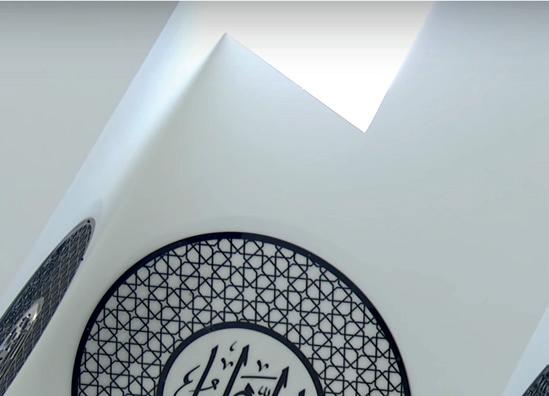
Friday 23 June 2023 | AL HAKAM 22
language. The number of the Community’s President appeared on screen and so I contacted the Community. Thereafter, I read the Community’s literature, and a book by the Khalifa titled World Crisis [and the Pathway to Peace]. Thereafter, my heart was content, I took the pledge of allegiance and entered the fold of the Community.” The local missionary there says that now he has become a very active member of the Community.
A missionary from Sierra Leone writes that there is a man named Ibrahim who was not necessarily an opponent of the Community, but he was not an Ahmadi. He heard one of my sermons on MTA and began openly saying, “The clerics who give teachings against the Community are rooted in falsehood. I have heard the Imam of the Community give references from the Holy Quran; he mentions the Holy Prophetsa and the ahadith. Ahmadis also have the same creed. Everything is in accordance with Islam; so, how can the Ahmadiyya Muslim Community be false?” Thereafter, he accepted Ahmadiyyat and also became involved in offering financial contributions. He is a very sincere Ahmadi.
The Amir of Trinidad said that last year, a new convert named Shareeda accepted Ahmadiyyat along with her husband. She invited two of her friends and neighbours to her home to watch the proceedings of Jalsa UK on TV. They were very impressed with the entire organisation of Jalsa and especially with my speeches, which they say they enjoyed very much. They said that the Ahmadiyya Community is the true Islam and if all the sects in Islam became like them, then Islam could prevail in the world. [One of the guests] says, “I started crying upon seeing the Khalifa and felt as if I was sitting in his presence.” Her husband had passed away; however, sometime later, she pledged her home, and handed it over to the Community, and this is currently in the process.
A local from Kyrgyzstan named Sultan Ata Khanu accepted Ahmadiyyat. He says, “My wife and son had already pledged allegiance. In 2017, I started to offer the Friday prayer at the Community’s mission house. When my wife and I would drive to the Friday prayer, a journey of about twelve kilometres, we would always listen to a recording of the Khalifa. Whenever I heard a sermon of his, my convictions would become firm. Hence, that same year, on 2 May, at the end of the holy month of Ramadan, on the day of Eid, I pledged allegiance.” This is from last year. He says, “I wished to mention this earlier, but for one reason or another, this always got delayed. I have written this in brief, however, everything that is happening inside my soul cannot be expressed in words. In every prayer, I pray to Allah that He increases my knowledge about Islam, and every Friday prayer opens something new for me.”
A woman from Paraguay named Liza says, “Allah the Almighty has ordained different ways for different people to be guided. My journey to Islam Ahmadiyya began during the Coronavirus pandemic. I thought that I should learn a new language during my free time, so I started taking online Arabic classes. Through learning Arabic, I also learned quite a bit about Islam, so I started studying and learning about it. One day, when I opened my
Facebook account, I saw an invitation for a programme being held at the mosque called ‘Coffee, Cake, and Islam.’ I registered myself and arrived on the day, which is when I met the missionary and his wife. I had some doubts in my mind before and thought that perhaps only Arabs could go to the mosque. But when I went there, whatever I learned about Islam was completely new to me. I learned that Islam teaches that there is no compulsion in matters of religion and that Islam is a religion only of peace and harmony.
That night, when I left the mosque, I had a copy of the Holy Quran in hand. Afterwards, I remained in constant contact with the missionary’s wife, whom I asked a lot of questions, and I started attending the weekly classes. I set a goal for myself to memorise and learn the entire salat. Two months passed by, during which I spent every moment thinking about Islam. One day, when my husband came to pick me up from the mosque, I was telling him on the way back about what I had learned that day. My husband said to me, ‘Why don’t you just become a Muslim?’ Upon hearing this I became completely silent, and my eyes filled with tears, because at that time, my only desire was to become a Muslim. But this was a very big decision for me. In any case, afterwards, I decided to become an Ahmadi Muslim. I obtained further information about the Community and did some research while also asking questions. I regularly listened to the Khalifa’s sermons, after which I was certain that I was on the right path; we have guidance, and we have one leader who cares for us, guides us, and prays for us. Although I still have much to learn, my heart is at peace with the Ahmadiyya Community.” A few months after pledging allegiance, her husband also pledged allegiance, and now they are very sincere and active members of the Community in Paraguay.
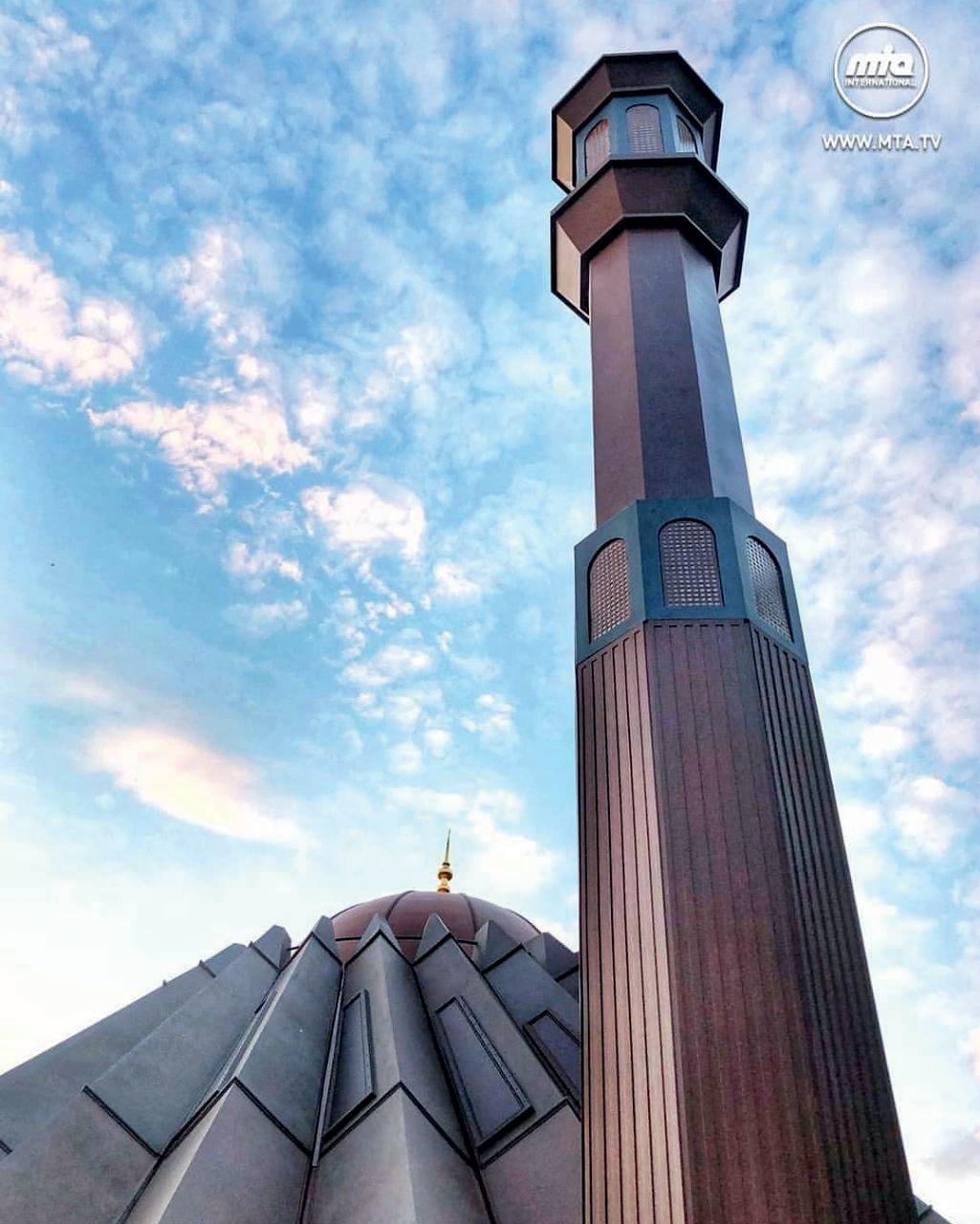
In Congo-Kinshasa, there is a small town or village near Bukavu, where there is a man by the name of Ahmad Batatu, who, along with eight members of his family, pledged allegiance. Afterwards, he started propagating the message [of Islam Ahmadiyyat], resulting in 62 people entering the fold of the Community. He says that the biggest reason for his joining the Ahmadiyya Community was the Khalifa of the time and the Khilafat. The Amir says that he is teaching him the Holy Quran online. He says, “Before entering the fold of the Community, I was a Sunni Muslim, however during those years I would ask myself why Sunni Muslims spread hatred. I would also wonder why there was so much discord amongst them and that if they were truthful, then why didn’t they have a single Imam whom they could follow? While undergoing this internal battle, I became attached to the sermons of the Khalifa on MTA. A voice within me said. ‘Hazrat Mirza Ghulam Ahmadas is truthful’, but there was another voice saying, ‘Why do the rest of the Muslims regard Ahmadis to be disbelievers?’ Eventually, I came into contact with an Ahmadi from Tanzania and then with another Ahmadi in France. I eventually got in contact with the area’s missionary, named Muzammil. All of them gave me books of the Community to read; after reading them and doing research, I pledged allegiance.” Thereafter, he started
propagating the message in his area, which helped the Community grow.
The Amir of Congo-Kinshasa says that Madame Mwani Teebo is from Uvira and is 82 years old. She says, “I was a Muslim, but I became Christian at the age of 82 because my son was a pastor in a church. One day, I heard the French translation on the radio of a sermon by the Khalifa, during which I called the mission house and said that I wished to pledge allegiance to the Imam of the age.” She told her son that after she passed away, she wishes for the Ahmadiyya Community to lead her funeral.
The missionary-in-charge of Cameroon says, “A member named Umar Zubair came from Maroua to attend the Jalsa Salana [Annual Convention] in 2022. He mentioned the details of his acceptance of Ahmadiyyat. Umar mentioned that he became acquainted with the Community through MTA Africa and he would listen to the Friday Sermon of the Khalifa with great interest. He said: ‘My attachment to the Community grew after each Friday Sermon and my knowledge also increased. In the first sermon of November 2021, the Khalifa mentioned incidents of people making sacrifices for Tahrik-e-Jadid Upon seeing the amount people were sacrificing for the sake of Islam, God Almighty enlightened me to the fact that this Community has been established by God Himself (if people are sacrificing this much for the sake of Islam, then this Community has been established by God). This point completely reassured me and after pledging allegiance, I entered the fold of the Community. From that point onwards, I have been content, and happy.’”
The missionary from Waterloo, Sierra Leone, says, “Last year, Mr Alfa was invited
to listen to the Friday Sermon on MTA. He came to listen to the sermon along with his family. The sermon left a good impression on him, and all his family. Then, the entire family, which comprised eight people, pledged allegiance and joined the Community. By the grace of Allah, he serves the Community with great sincerity. A mosque was being renovated there; he spent most of his time helping with the renovations and worked as one of the labourers. He would keep voluntary fasts and make arrangements for people to break the fast.”
The Amir of Bangladesh writes, “The Community Tabligh Secretary owns a printing press and a man named Bilal worked in that press. When he was introduced to the Community, he began coming to our central mosque, where he listened to the Friday Sermon. After a short while, Bilal pledged allegiance, but his wife did not. He had been married for seven years but did not have any children. He said to his wife: ‘Let us write to the Khalifa for prayers so that Allah the Almighty blesses us with a child. People always write for this, let us try as well.’ Hence, he managed to convince his wife for them to write a letter requesting prayers and subsequently sent the letter. A few months later, his wife became pregnant. His wife realised that it was due to the prayers of the Khalifa that Allah the Almighty blessed them. Therefore, she also pledged allegiance.”
The Amir of Belgium writes, “There is a man who is originally from Morocco but has been living in Belgium for a long time. He first read about the Community and then pledged allegiance. He said, ‘Since my childhood, I have spent a lot of time with
23 AL HAKAM | Friday 23 June 2023
Muslim scholars. However, the sermons of the Khalifa are not only the commentary of the Holy Quran, rather, they bring you closer to God Almighty. After listening to his sermons, I now enjoy offering Salat Allah the Almighty showed me true dreams as well. Ahmadiyyat has changed my life completely.’ Whenever the gentleman speaks about this, he is overcome with emotion.”
The missionary from Kenema, Sierra Leone, says, “More than 500 non-Ahmadis were present in a gathering. A person stood up and said: ‘Only the Ahmadis follow the true teachings of Islam. We despise them because they always speak the truth. If something is white in colour, they will say
it is white. In our case, even if something is black, we will declare it to be white. This is the reason why there is no unity or organisation amongst us.’ An Imam of the local area also stood up and said: ‘If you listen to the sermons of the Khalifa of the Ahmadis, you will come to learn of Islam’s true teachings. I have not accepted Ahmadiyyat, but each Friday, I listen to the sermon delivered by their Khalifa. If you all listen to it, you will learn the true teachings of Islam and you will not want the sermon to end.’”
The missionary serving in the Mashaka region says that he went to the bank and upon finishing what he had to do, he felt hungry and so he went to a hotel in order to eat. MTA was being played on the TV in the hotel and people were listening to a recorded sermon of mine. He asked the hotel management about this, and they told him that they often watched this channel and learned many good things from it, which they greatly benefited from. They also expressed that they liked to watch this channel. Hence, Allah the Almighty also provides the means to propagate the message of the Community in this manner, and the importance of Khilafat is being manifested to the people.
The missionary of Mali, Umar Muaz, writes, “There is a member from the Djenné region named Jala. He mentioned that the bones in his legs had broken due to an accident. Despite undergoing different types of treatment, including traditional sub-continent remedies, and having it checked by doctors, his bones were not healing. He and his relatives had become greatly disheartened and thought that his bones would never heal. He said that one
day he saw in a dream that the Fifth Khalifa had prayed for him and in his dream he was repeating the words, ‘amin’ as he was praying. He says that upon waking up from the dream, he said ‘amin’ and passed his hands over his legs. He says that after this, Allah the Almighty bestowed His blessings upon him and although he previously felt hopeless over the recovery of his legs, his bones now began to heal gradually. Now, by the grace of Allah the Almighty, he is completely fine and no one can even tell that the bones in his legs had broken.”
Thus, Allah the Almighty provides the means to strengthen people’s relationship with Khilafat in this manner as well.
With regards to the impact upon others, the Amir of Congo-Kinshasa writes that, by the grace of Allah the Almighty, apart from the Community’s radio station, there are 23 other FM radio stations on which the tabligh [propagation] and tarbiyat [moral and spiritual training] programmes are aired on a weekly basis, as well as my Friday Sermons. The Friday Sermon is also aired live on two local TV stations in Bandundu and they are receiving good feedback on this. He met a local Christian doctor once and he said, “I listen to the sermon of your Imam and he delivers it in a very impactful manner. I request that you also translate this into the local language in order to maximise the number of people who can derive benefit from it.
Thus, Allah the Almighty is providing means in this manner as well in order to convey the message of Islam, Ahmadiyyat. Even the non-Ahmadis are drawing attention to the fact that the words of the Khalifa of the time should be conveyed to others. In this way, the land is being
Aisha Academy UK Admissions Open
Admissions are now open for Aisha Academy, Institute for Theology and Modern Languages, whose objective is to increase religious knowledge and understanding.
This is a one-year full-time course, open to all girls and women aged between 16 and 30 who have completed GCSE (or equivalent) and can be attended both in person and virtually (online).
The course will run from September 2023 to July 2024, insha-Allah.
If you have any queries, please contact:
Principal Aisha Academy

Baitul Ehsan, 25 Willow Lane Business Park, Mitcham, CR4 4TS
prepared and a time shall come when the hearts of the people shall open to accept Ahmadiyyat, the true Islam, God-willing. Thus, the continuous blessings of Khilafat which have been promised by Allah the Almighty to the Promised Messiahas are being fulfilled in such astonishing ways that one cannot even imagine. These accounts of Ahmadis and non-Ahmadis, as well as the signs of Allah the Almighty in favour of Khilafat-e-Ahmadiyya are, in fact, proof of the support of Allah the Almighty and the truthfulness of the Promised Messiahas, who came in servitude to the Holy Prophetsa in order to unite the world. It is only the Ahmadiyya Community that is making efforts to help the progress of Islam and its propagation in the world under the system of Khilafat. The progress we are witnessing despite the difficult circumstances is, in fact, proof of the practical testimony of Allah the Almighty’s support for us. If not, then what else is it? However, those who are [spiritually] blind cannot see this. God-willing, Ahmadiyyat and Khilafat on the precepts of prophethood, which was prophesied by the Holy Prophetsa, and which began with the advent of the Promised Messiahas, shall continue till the Day of Judgement and the enemy cannot even do the slightest harm to them.
Thus, we ought to strive to further strengthen our faith, remain attached to Khilafat-e-Ahmadiyya and be ready to offer every sacrifice for its establishment. May Allah the Almighty enable us to do so.
(Official Urdu transcript published in the Daily Al Fazl International 16 June 2023 pp. 2-6. Translated by The Review of Religions.)
The subjects taught are:
• e Holy Quran including: Nazira, Split Word
Translation, Hifz and Commetary of the Holy Quran;
• Hadith;
• Kalam;
• Comparative Study of Religions;
• Fiqh (Islamic Jurisprudence); History of Islam & Ahamadiyyat;
• Basic Arabic, Urdu and English.
Friday 23 June 2023 | AL HAKAM 24
Editor-in-chief: Qaasid Muin Ahmad | Executive editors: Ataul Fatir Tahir, Aqeel Ahmed Kang | Research coordinator: Awwab Saad Hayat | Associate editors: Jalees Ahmad, Ata-ul-Haye Nasir Translations: M Adam Ahmad | Design: Tahmeed Ahmad | © Al Hakam 2023
Phone: 020 3146 1060 | Email: principal@aishaacademy.uk



























 Lajna Imaillah
Lajna Imaillah













 Khalifatul Masih IIra
Khalifatul Masih IIra




 Ehtesham-ul-Islam
Student Jamia Ahmadiyya UK
Ehtesham-ul-Islam
Student Jamia Ahmadiyya UK
















